- Utility Menu

GA4 tracking code

- All URAF Opportunities
- Research Ambassadors
- CARAT (Opportunities Database)
- URAF Application Instructions
- URAF Calendar of Events and Deadlines
Writing Application Essays and Personal Statements
Some applications ask that you write an essay that draws on more personal reflections. These essays, sometimes called Personal Statements, are an opportunity to show the selection committee who you are as a person: your story, your values, your interests, and why you—and not your peer with a similar resume—are a perfect fit for this opportunity. These narrative essays allow you to really illustrate the person behind the resume, showcasing not only what you think but how you think.
Before you start writing, it’s helpful to really consider the goals of your personal statement:
- To learn more about you as a person: What would you like the selection committee to know about you that can't be covered by other application materials (e.g. resume, transcript, letters of recommendation)? What have been the important moments/influences throughout your journey that have led to where (and who!) you are?
- To learn how you think about the unsolved problems in your field of study/interest: What experiences demonstrate how you've been taught to think and how you tackle challenges?
- To assess whether you fit with the personal qualities sought by the selection committee: How can you show that you are thoughtful and mature with a good sense of self; that you embody the character, qualities, and experience to be personally ready to thrive in this experience (graduate school and otherwise)? Whatever opportunity you are seeking—going to graduate school, spending the year abroad, conducting public service—is going to be challenging intellectually, emotionally, and financially. This is your opportunity to show that you have the energy and perseverance to succeed.
In general, your job through your personal statement is to show, don’t tell the committee about your journey. If you choose to retell specific anecdotes from your life, focus on one or two relavant, formative experiences—academic, professional, extracurricular—that are emblematic of your development. The essay is where you should showcase the depth of your maturity, not the breadth—that's the resume's job!
Determining the theme of an essay
The personal statement is usually framed with an overarching theme. But how do you come up with a theme that is unique to you? Here are some questions to get you started:
- Question your individuality: What distinguishes you from your peers? What challenges have you overcome? What was one instance in your life where your values were called into question?
- Question your field of study: What first interested you about your field of study? How has your interest in the field changed and developed? How has this discipline shaped you? What are you most passionate about relative to your field?
- Question your non-academic experiences: Why did you choose the internships, clubs, or activites you did? And what does that suggest about what you value?
Once you have done some reflection, you may notice a theme emerging (justice? innovation? creativity?)—great! Be careful to think beyond your first idea, too, though. Sometimes, the third or fourth theme to come to your mind is the one that will be most compelling to center your essay around.
Writing style
Certainly, your personal statement can have moments of humor or irony that reflect your personality, but the goal is not to show off your creative writing skills or present you as a sparkling conversationalist (that can be part of your interview!). Here, the aim is to present yourself as an interesting person, with a unique background and perspective, and a great future colleague. You should still use good academic writing—although this is not a research paper nor a cover letter—but the tone can be a bit less formal.
Communicating your values
Our work is often linked to our own values, identities, and personal experiences, both positive and negative. However, there can be a vulnerability to sharing these things with strangers. Know that you don't have to write about your most intimate thoughts or experiences, if you don't want to. If you do feel that it’s important that a selection committee knows this about you, reflect on why you would like for them to know that, and then be sure that it has an organic place in your statement. Your passion will come through in how you speak about these topics and their importance in forming you as an individual and budding scholar.
- Getting Started
- Application Components
- Interviews and Offers
- Building On Your Experiences
- Applying FAQs
10 Successful Harvard Application Essays | 2020
Our new 2022 version is up now.
Our 2022 edition is sponsored by HS2 Academy—a premier college counseling company that has helped thousands of students gain admission into Ivy League-level universities across the world. Learn more at www.hs2academy.com . Also made possible by The Art of Applying, College Confidential, Crimson Education, Dan Lichterman, Key Education, MR. MBA®, Potomac Admissions, Prep Expert, and Prepory.

I am standing behind my high school when a snowball pelts my side with a thud and splatters across my jacket, covering me with a fine, icy dust. My bewildered eyes trace the snowball’s trajectory until they fall upon a pair of snickering hoodlums crouched behind a small mountain of snowballs. They must have been waiting all afternoon for an unsuspecting student to walk by, and perhaps for emphasis, one of the boys looks me in the eye and raises a grimy middle finger. Quickly, I mold a handful of snow into a sphere with cupped hands and cock my arm back.
I haven’t thrown anything in a while, but muscle memory guides me through the requisite motions. I played softball for eight years, and my athletic strength was always my throwing arm; in fifth grade, when my coach asked me to throw the ball from third to first, I hurled the ball with such force that the catch knocked him off-balance. Upon entering high school, it seemed natural that I would play on the school’s softball team.
However, my body had other ideas. Throughout middle school I’d developed increasingly painful body aches, and in freshman year I awoke one morning with a brutal headache penetrating the crown of my head and the bones of my face as though a vice had been clamped to my skull overnight. After consulting more doctors than I can remember, I was diagnosed with fibromyalgia.
Fibromyalgia is characterized by chronic widespread pain and extreme sensitivity to touch. My neurologist describes fibromyalgia as “headache of the body.” Personally, I favor my father’s description; after one particularly painful and exhausting day he aptly proclaimed, “Fibromyalgia is your body’s way of giving you the finger.”
Agonizing muscle cramps mocked me constantly, preventing me from walking longer than five minutes without growing exhausted. The pressure above my eyes sneered at me whenever I attempted to read or write. Even after I found medications to temper the headaches just enough so I could return to school with sporadic attendance, sharp pains gnawed at my body with haughty derision if I even thought about returning to the softball fields and the activities I loved.
For months I tried to ignore the cruel obscenities fibromyalgia hurled my way, steadfastly believing the pain would soon subside and I would achieve everything I had planned for myself if I simply disregarded the taunting aches and worked doggedly to catch up at school. But when softball season arrived, it became apparent that while determination and intelligence could preserve my GPA in the face of fibromyalgia, there was no personal attribute or skill that could heal my body and allow me to join my teammates on the field.
It was time to confront the beast.
In doing so, I kept in mind the schoolyard aphorism that there is strength in numbers. I did not face fibromyalgia alone, but with mathematics by my side. Baseball is a game of statistics, and if fibromyalgia threatened to steal the sport I loved through physical deterioration, I would outsmart this insolent illness and reclaim ownership of baseball through intellectual pursuits. I began a mathematical research project, analyzing the effectiveness of current baseball statistics, as well as deriving my own.
Fibromyalgia forced me to redefine my goals and personal standards for success. This baseball project was my first step toward reclaiming my life and laying the foundation for victory over my illness. As calculations replaced pitching drills, my passion for baseball was channeled into a burgeoning love of science and math. Hours I had previously devoted to softball became filled with scientific journals and books, and summers I used to spend at athletic camps were devoted to research at local universities. Baseball provided a link to my pre-fibromyalgia life at a time when I desperately needed one, and through baseball I realized that if I wanted to beat fibromyalgia, I could not simply hope it would disappear overnight. Whether I modified my medications or adapted my schedule, I needed to devise my own way to face fibromyalgia’s antagonizing aches head-on.
So when that taunting rascal waves his middle finger in my direction, my cheeks do not flush with angry humiliation and my legs do not run away, but my hands mold a snowball and my arm pulls back. As I follow through with my throw, pain radiating up my arm, I know instantly that I will pay for this exertion in the morning. But my icy comeback hits the sniggering boy squarely in the chest, knocking him backward into the snow as his accomplice’s mouth lies agape in shock.
Well. I guess I’ve still got it.
Sarah's story opens with a vivid anecdote of being pelted by a snowball that brings the reader to the scene of the crime with detailed sensory descriptions. She skillfully ties the story to her talent for athletics, which in turn leads to her struggle with fibromyalgia and howin the face of physical limitation she redirected her passions to science and math. The story comes full circle and ties together nicely at the end with the conclusion of the snowball scene, which leaves the reader feeling victorious and vindicated for Sarah, as well as proud of her determination.
Sarah manages to cover a lot in this essay. The personal statement is an evident combination of overcoming obstacles and discovering academic passions, and also discreetly includes résumé- worthy accomplishments, such as her own mathematical research project on baseball statistics and summer research at local universities. What is important about her personal statement is that she goes beyond the résumé and gives the admissions officers a look at her character and personal struggle. Even though her essay is a bit long, Sarah does not waste a word and ensures that every detail she includes contributes in some way to the overall message she is trying to convey about herself. Rather than simply evoking sympathy for her situation, Sarah weaves humor and a cheeky attitude throughout her narrative. She introduces her love of mathematics with a creative twist on the common saying, “strength in numbers," and affectionately alludes to her father's depiction of fibromyalgia as "your body's way of giving you the finger."
Her vivacious and tenacious personality shines through in her colorful and descriptive language, painting a clear picture of Sarah as a determined person who doesn't let a chronic illness defeat her and instead finds another passion.

I look over at the digital clock at the front of the bus just as the time changes to 8:30. The engine begins to rumble, the seat begins to shake, and the bus slowly pulls onto Route 6 and heads toward JPA—the Jay Pritzker Academy—near Siem Reap, Cambodia. The bus is alive with chatter. Peace Corps volunteers trade stories about their experiences in their assigned villages; international schoolteachers discuss their plans for the day’s lessons. I overhear one of the Peace Corps volunteers, Deidre, say, “I have to say, the Peace Corps offers incredible health care. They medevaced me to Bangkok when I got dengue fever.”
Today, I find myself unable to join the conversation. I stare blankly at the blue cloth seat in front of me, trying to gently coax my knotted stomach out of my throat. All I can think about is the empty seat beside me and the uncomfortable feeling of entering uncertain territory alone.
My friend and co-teacher, Shahriyar, is in the Angkor Hospital recovering from a serious bout of amoebic dysentery. I visited him yesterday. He was lying in bed with his summer reading in his right hand and an IV in his left. Looking pale and exhausted, he weakly lifted his head and greeted me. “I don’t know if you know this yet,” he said, “but I’m flying home tomorrow. Are you coming with me?” Though the news didn’t surprise me, the question caught me off guard. As I left the hospital room, I couldn’t help but think how easily this could have been me in his situation.
The bus drives over a speed bump faster than it should have, and I’m jolted back to the present. I try to take my mind off Shahriyar and look out the window at the world around me. Everything is so much different than it is in Deerfield, yet it all somehow feels very natural to me. To my left I see an elderly woman wearing a mask sweeping dust off the street; I smile at her, but she doesn’t notice. As the bus gets closer and closer to JPA, the fact that I will have to teach today’s lessons by myself begins to set in. I wonder if I’m physically capable of teaching three hours of class by myself in the ninetydegree heat and 90 percent humidity. In the past, Shahriyar and I had always taken turns leading the class, giving each other a few moments to rest and rehydrate while the other taught. A part of me is afraid to do it. I’ve never had to lead the class without the comfort and support of having Shahriyar by my side. As I think about the challenges I will face, I realize how easy it would be to turn back. I only have to call Sokun—a local tuk-tuk driver and he’d take me to the airport. Knowing my co-teacher has become seriously ill, nobody would think less of me if I went home today.
As I sit in my seat, planning my trip home, the bus slows nearly to a stop and then turns onto a narrow red dirt road. I’ve suddenly plunged into a new world. The mess of worn-down concrete buildings and mopeds gives way to miles of flooded rice paddies stretching as far as I can see. Every few hundred yards I see boys and young men working barefoot in the fields. The bamboo huts that dot the landscape make me think back to my visit to the house of one of my students, Dari. I remember looking into his room and seeing a wooden table on his dirt floor. Close by, a bamboo shelf was filled with books. The globe he had won for being on the Honor Roll was proudly displayed on the bookshelf among his prized possessions. Smiling ear to ear, he told us that JPA was the best thing in his life. I realize that it really is too late to go home. I’ve already fallen in love with my students.
As the bus pulls into JPA’s driveway, the rest of the teachers begin gathering their materials. I remain seated, deep in thought. “Are you coming?” I hear a familiar voice ask me. I look up and see Deidre looking at me.
“Of course I am.”
In essays about community service, it is easy to fall into the trap of self-aggrandizement— emphasizing your own personal sacrifices and good deeds and in the process making yourself look like someone more interested in self-service than community service. Josh’s essay, on the other hand, steers well clear of this pitfall, skillfully conveying compassion, humility, and devotion to the people with and for whom he works—he does not stay on because he pities his students, but because he loves them. As a result, instead of coming off like résumé padding, Josh’s work feels motivated by a genuine desire to do good.
Structurally, Josh’s essay is solid—it traces the trajectory of his thought process from uncertainty to renewed resolve. This seemingly straightforward story arc is enlivened by choice details and images—the off-hand conversation about dengue fever in the first paragraph, for example, adds a good jolt of surprise, and the descriptions of the Cambodian countryside are vivid and well-executed. The passage detailing Josh’s visit to his student Dari’s home is one of the essay’s highlights, a scene that is both believable as the essay’s “inspiration moment” and memorable for the deep empathy it contains.
While it’s true that Josh has the advantage of a rather unique experience—not every Harvard applicant is in a position to write their personal statement about volunteering with the Peace Corps— the main strengths of his essay are certainly translatable beyond this context. Josh’s essay is a personal statement at its best: it not just narrates an experience but hints at deeper elements of his personality and expresses them in a way that does not come off as forced. Someone reading Josh’s essay can tell that his volunteering experience was far more to him than résumé fodder. And as the admissions office gets deluged with more and more applications every year, this spark of sincerity goes very far indeed.
I sat under the table, burying my head tightly in my folded arms, while the other children sat on the carpet, listening to the teacher’s story. The language barrier was like a tsunami, gurgling with strange and indistinguishable vocalizations. Elementary school wasn’t as fun as I expected at all.
Hearing a whisper, I raised my head up, only to notice a boy’s face merely inches away. I bolted up in surprise, my head colliding gracefully with the underside of the table. Yelping in pain, I noticed that the entire class was staring at me.
That was the story of how I met my first friend in Canada.
That boy, Jack, came to visit me during my lonely recesses. It was rather awkward at first—I could only stare at him as he rambled on in English. But it was comforting to have some company.
From there, our friendship blossomed. Our initial conversations must have been hilarious to the hapless bystander. Jack would speak in fluent English while I spurted sentence after sentence of Mandarin. It was like watching tennis—rallies of English and Mandarin back and forth. But I learned quickly, and in no time I was fluent.
Jack also showed me the ropes of Western culture. Heaven knows how embarrassing my birthday party would’ve been if he hadn’t told me about those so-called “loot-bags” beforehand.
Today, I volunteer at a community service agency for new immigrants where I work with children. I do it because I understand the confusion and frustration of dealing with a strange and sometimes hostile environment; I remember how it feels to be tangled up in an amalgam of unfamiliar words and sounds. And so I teach them; I give seminars on reading, writing, and speaking skills as well as Western culture, history, and sometimes, a bit of social studies.
But I strive to do more than just that. I try to be a friend—because I remember how Jack helped me. I organize field trips to the science center, the museum, and the symphony: double-whammy trips where children can have fun while improving their literacy skills.
Through these experiences, I try to understand each of them as unique individuals—their likes, dislikes, pet peeves, background.
Everyone needs a guiding light through the lonesome process of adaptation, a friendly bump to lift them from the dark shroud of isolation. That’s what Jack did for me—with a rather painful bump to the head—and it’s also what I do for these immigrant children.
My hope is that, one day, these children will also feel compelled to do the same, helping others adapt to an unfamiliar environment. With this, we can truly create a caring and cohesive network of support for the children of our society.
Lucien's essay depicts a personal connection with his community service activity and provides the why to an extracurricular that probably shows up college application. He starts off with an endearing anecdote of meeting his first friend in Canada and connects the encounter to his current passion, then delves even deeper by concluding with self- reflection and a bigger goal for society that he hopes to achieve. His personal statement gives the reader a glimpse at his background and assimilation into a new culture, and how his qwn experience as an immigrant motivates him to help other immigrants adapt to life in a new place.
The strengths of this essay lie in the vivid and charming recounting of his first encounter with Jack, his first friend in a foreign new environment, and how he uses that story to explain his passion for volunteering. He connects his community service to a bigger goal at the end of the essay that leaves the reader feeling inspired, and alludes to his thoughts, hopes, and dreams. There is a tone of humility and humor as he depicts how he met his first friend by bumping his head under the table, and makes a motif out of the head bump by referring to it again later when he's talking about helping other immigrant children. He modestly credits his noble deeds at the community service agency to meeting his first friend, and humbly reveals his hope that his own good deeds will inspire others to pay it forward. He does a good job of exhibiting his accomplishments in community service without sounding like he's bragging.
Lucien could also make the essay more memorable and distinctive by including anecdotes of his experiences at the community service agency where he gave seminars and organized field trips. He denotes his volunteering responsibilities in list form, which can seem a bit impersonal and résumé- like. For example, he mentions how he tried to understand the people he helped, but does not include how he goes about doing this, or whether learning about those unique individuals contributed to his experience. Adding a story of how he changed the lives of the immigrants he helped would enhance his message and create a fitting parallel with the anecdote of how Jack helped him as he assimilated only one line on the activities portion of his into Western culture. Overall, Lucien combines humor with humility and leaves the reader feeling inspired.

I think the most tragic part of my childhood originated from my sheer inability to find anything engraved with my name. I never had a CHAFFEE license plate on my hand-me-down red Schwinn. No one ever gave me a key chain or coffee mug with the beautiful loops of those double Fs and Es. Alas, I was destined to search through the names; longingly staring at the space between CHAD and CHARLOTTE hoping one day a miracle would occur. Fortunately, this is one of the few negative aspects of a name like “Chaffee Duckers.”
My name has always been an integral part of my identity. Sure, it sounds a bit like my parents created it from a bag of Scrabble tiles, but it comes from a long-lost ancestor, Comfort Chaffee. Now it’s all mine. In my opinion, a name can make or break a person. The ability to embody a name depends on the individual. My greatest goal in life is to be the kind of unique person deserving of a name so utterly random and absurd.
I began my journey in preschool. Nothing about me screamed normal. I was not prim, proper, and poised. I preferred sneaking away from my preschool classroom, barefoot, in the purple velvet dress I wore every single day to resting obediently during nap time.
I grew up in a family akin to a modified Brady Bunch. Stepsisters, half sisters, stepbrothers, and stepparents joined my previously miniscule household. But in a family of plain names like Chris, Bill, John, Liz, Katherine, and Mark, I was still the only Chaffee.
I was a bit of a reverse black sheep in my family. My name helped me carve an identity separate from my myriad of siblings. Instead of enriching my brain with Grand Theft Auto, I preferred begging my parents to take me to the bookstore. While my parents mandated homework time for my brothers, they never questioned my work ethic or wiretapped my assignment notebook. The thing that set me apart from the herd was that I was self-disciplined enough to take control of my own life. From the very beginning I never depended on my parents’ help or motivation to finish my schoolwork. Putting school first came naturally to me, much to the distaste and confusion of my siblings. My work ethic became known as the patented “Chaffee Method.”
As I got older, I began to embody my name more and more. I didn’t want to be that girl with the weird name in the back of the class eating her hair, so I learned how to project my ideas in both written and spoken forms. I was often picked to lead classroom discussions and my complete disregard for making a fool of myself bolstered that skill. The manner in which I operate academically is perfectly described as Chaffee-esque; including but not limited to elaborate study songs, complex pneumonic devices, study forts, and the occasional John C. Calhoun costume.
I take pride in the confusion on a person’s face when they first read my name. Seeing someone struggle over those two unfamiliar syllables fills me with glee. I feel as though I am adding a new word to their vocabulary. So on my last day as a page in the U.S. Senate, I prepared myself for the anticipated awkward stumbling as Senator Harry Reid thanked me by name in his closing address. But the stumble never came. I felt very humbled by his perfect pronunciation. Perhaps Chaffee is actually catching on!
Chaffee’s essay is strong because it follows a clear narrative, all enabled by her rather unusual name. While not everyone has a name as unique as “Chaffee,” and are therefore unable to use this approach, writing an essay about an experience or aspect of one’s life that is singular to oneself is a smart approach for any college essay. She shapes her development from preschool to high school in the lens of her name, demonstrating the importance that it has played throughout her life.
Chaffee’s initial anecdote immediately grips the reader; many people have shared the experience of looking for engraved merchandise, and the fact that she can find none bearing her name sets the stage for the rest of the essay. Chaffee quickly qualifies her discontent with her name, stating that this anecdote “is one of the few negative aspects of a name like ‘Chaffee Duckers.’” Unfortunately this qualification is a bit misplaced since she immediately returns to tell a story of her upbringing while failing to address any of the positive aspects of her name until paragraphs later. This is a bit of hedging that isn’t entirely necessary in the limited space allowed by most personal statements.
Yet, the essay works quite well. Chaffee spends a great deal of time elaborating on how she was different from both her family and others with examples of her transgressions in preschool and her penchant for schoolwork and education as opposed to procrastination or video games like Grand Theft Auto. Chaffee toots her own horn just a little bit when describing the merits of her work ethic, but it is still fairly endearing overall, and there is no shame in sharing a desire for learning. Chaffee states in the conclusion of her essay that she now takes “pride in the confusion on a person’s face,” as they try to read her name, demonstrating how she has now accepted and come to appreciate the fact that she does not share a name with the average Mary, Dick, or Jane.

“Let’s face it, you’re slow,” my violin teacher said.
He was, as always, complaining that running was detracting from my practice time.
That summed up what running had always meant to me, ever since I was a seventh grader, choosing his sport for the first time. I was fine and content, however. I always had Jeffrey and Archie, classmates like me who ran slowly. We were good friends. We laughed together; we raced together; we pushed each other, and endured tough workouts together. But after middle school the people I trained with went on to do things they were better at. I remained, even though I was not good enough to be considered for varsity.
High school running was hell. I struggled with workouts, most of which I had to run alone. In the hot, dry days of autumn, I often coughed on the dust trails left by my teammates as they vanished into the distance. During the workouts, I got passed incessantly, almost getting run over on occasion. It hurt not to be important; to be dead weight for the team. I looked forward to the next year, when I could hopefully run with the incoming freshmen.
It didn’t happen that way. Even a year later, I was still the slowest on the team. How could the freshmen who had snored off the whole summer beat me, a veteran from middle school and high school with decent summer training? I nevertheless reconsidered the effectiveness of my training, and looked forward to getting “back in shape.” It was only after my condition had been deteriorating steadily for a few weeks that I began to feel a new level of humiliation. I started to have trouble keeping up with old ladies in the park, and each day I worked frantically to prevent the discovery of that fact by my teammates, running toward the sketchy areas of the ramble, in the south, where there’s barely anybody. My mother, worried about the steady deterioration of my condition, contacted a doctor.
I was anemic.
The doctor prescribed a daily iron pill, and the results were exhilarating. I joked that I was taking steroids. I sunk into endless oxygen. I got tired less. During the workouts, I felt more machine than man. Iron therapy taught me something fundamental. It reminded me why I was running; why I had stuck to this damn sport for four straight years. When I was anemic, I struggled to gather what little motivation I had for those painfully slow jogs in those parks. Putting the effort in, and seeing the dramatic results fooled my mind like a well-administered placebo. Iron therapy was the training wheels that would jump-start my dramatic improvement.
It took four months—four months of iron pills, blood tests, and training—to get back to my personal best: the 5:46 mile that I had run the year before. Early February that year, the training wheels came off. I was running close to seven miles a day on my own. But I wasn’t counting. I could catch a light. I could walk as many stairs as I wanted without getting tired. I was even far ahead of where I was the year before. After two and a half years as a 5:50 miler, I finally had a breakthrough race. I ran a 5:30. I asked coach if I could eventually break 5 minutes. He told me to focus more on maintaining my fitness through spring break.
I ran the mile again, this time outdoors. Coach had me seeded at a 5:30. I ran the first lap, holding back. I didn’t want to overextend myself. I hoped to squeeze by with a 5:35. The euphoria was unprecedented as I realized by the second lap that I was a dozen seconds ahead and still holding back. I finished with a 5:14.
On the bus ride back from the meet, one of my long-standing dreams came true. I pretended to ignore Coach sitting next to me, but he kept on giving me glances. He was excited about my time. We talked a lot about the race. We talked about my continuous and dramatic improvement. He said it was early in the season and that I would break 5 minutes after only a few weeks of training.
Six weeks later, Mr. Song, my chemistry teacher, asked me if I had broken 5 minutes for the mile yet. I told him all about how I had run in three meets over the past month and had failed to break 5:15 on every one of them. I told him that 5 minutes was now for me a mirage in the distance. Mr. Song, however, did not show much concern: “You’re just overtrained. Once you ease up before the big meet, you’ll drop in time once more.”
Even though these consoling words were from the man who had baffled my nutritionist when he had guessed that I was anemic, I still doubted his wisdom. On Sunday, I would run the mile once. My last mile of the year. This was it. Using my tried-and-true racing strategy, I finished with a 5:02, a 12- second drop in time. Mr. Song’s predictions had again turned out to be correct.
Before I was anemic, the correlation between hard work and success was something that only appeared in the cliché success stories of the talented few. Now, I am running more mileage than I ever have before. And my violin teacher still complains.
But I smile. I know it’s going somewhere.
John opens this essay by illustrating the iconic “grabber” done well: simple, unexpected, and leaving the reader wanting more. Is he actually “slow” at the violin (but that doesn’t quite make sense, does it)? We then learn all about John’s true passion: running.
Although challenging (and not to mention the fact that he always finishes last), John has stuck with running for many years. Eventually, his “slowness” deteriorates to the point where he needs medical intervention and finds his kryptonite: iron. This magic mineral allows him to heal, excel in his running, and ultimately exceed his wildest expectations by almost breaking the 5-minute mark by a few seconds.
The themes that permeate this essay are perseverance and tenacity: that all-powerful “grit” that distinguishes this student. John guides us through his story through the lens of his infallible work ethic. Even though he did not reach his exact goal, he is seconds away from it, and the reader knows he will keep pushing to achieve it.
As a reader, I would love to hear more about what happens next. Is there another instance that demonstrates John’s persistence or has he applied this newfound confidence and self-awareness to other aspects of his life? This self-reflection section is the most important element of the essay as it allows admissions readers a window into what drives a student. It is important to develop this and “show” the evidence of how the student has changed or what they have learned from this experience.
As the essay culminates, John makes us smile as he smiles (even though his violin teacher is still not too happy with him). We know John has learned to appreciate the beauty of the journey rather than the destination and we are just thrilled for him!

Soft Wooden Heart
The backbone of my life is my writing desk. I like to describe its surface as an organized mess (despite my parents’ overdramatized description of a bomb site), a state of positive entropy and minimum energy. Math exercises overlap an organizer, set next to almost-empty tubes of paint and overdue library books. A constantly filled bottle of water sits behind a glasses’ case full of guitar picks, and carved into a mountain of paper, right in the middle, is a space reserved for my laptop—on days when I am slouching, The Complete Works of William Shakespeare needs to be slid under it. An eclectic desk shows an eclectic personality; mine has had the honor of being the training grounds prior to the Great (final) Battle (exam) of Chemistry, the peaceful meadow of relaxed reading afternoons, and all in all the pristine-turned-colorful canvas of an inquisitive mind.
I remember buying it with my mother five years ago, when my bruised knees protested against the tiny white-paint-gone-yellow one I had used since childhood. My new desk was made of native Rimu heartwood—solid, resilient, dependable—a perfect role model for me to grow into. Over the years, its material became representative of my New Zealand identity, its surface slowly coated in quirky personality, and its compartments filled with treasured memories; the heartwood desk echoed my heart.
At first, it did not fit with the decor of the rest of my room, which even now appears boxy and stark next to my grandiosely elegant writing desk, but its quiet strength is unafraid of individuality, just as I have learned to become. It has watched as I grew stronger branches, a straighter trunk, firmer roots; whereas I had once been but a shy young seedling, I sprouted leaves and with them the ability and yearning to provide shade for others. I have certainly physically grown into it, but although I would like to think that I have become completely independent, I remain human; in inevitable times of need, it is still my steadfast, sturdy desk that offers its support.
I sit here and, well, I write: joyfully, desolately, irately, wistfully—at times paralyzed by excitement, at others crippled by fear. I scrawl notes in my organizer (which is, naturally, not in the least organized), words overflow my blog, overemotional oranges and blues plague my illustrations; shallow scratch marks indent the wood from where I have pressed too passionately into paper. It may be solid, but it is elastic enough to be shaped, resilient enough to adapt: This is my soft wooden heart.
It can take it. My desk remains constant despite scars of experience—unassuming, stoic, ever watchful. Even when I dismembered dying cell phones, their frail key tones pleading for mercy, the desk stood there, nonchalant. Regardless of what fervor goes on from time to time, it knows there will eventually be a constant calm; my lively nest of rebuilt mobiles still calls this place home. Sometimes, I rest my uncertain head on its reassuring solid surface and the wood presses back into my heartbeat, communicating in Morse: “Don’t worry. Some things will never change.”
And, like a mother, it always turns out to be right. Beneath my seemingly chaotic coat of papers and objects; beneath the superfluous, temporary things that define my present life, my desk and my heart remain still—solid, stable, and evergreen, ready to be written onto and scratched into by experience.
Winnie’s piece shows us that a meaningful essay doesn’t have to be about a major accomplishment or a painful personal experience; oftentimes, the most inspired writing can evolve from something as simple and unexpected as a writing desk. Winnie’s essay is successful because it invites readers into her world, where we discover a smart, unique, and self-aware young woman. Through her “eclectic” desk, we see her interest in the arts, her academic prowess, and her challenges with procrastination. We glimpse her pride in her heritage, her struggles with self-doubt, and her faith in herself to adapt to change and embrace new experiences. By the final sentence, we feel that if we heard Winnie’s voice in a classroom or sat next to her in the library, we would recognize her right away.
Winnie’s ability to bring herself to life through language also creates some challenges in her essay. She has so much to show us and does so in such creative ways that readers can feel overwhelmed by the information and figurative language that competes for our attention. Your college essay is a valuable opportunity to show who you are, but it’s not necessary to weave every aspect of your life into 650 words. For even the most gifted writers, less is often more.

Why a Republican Read The Communist Manifesto
I am a conservative. Point-blank. I’m not talking “hardcore, no gay marriage, abortion equates to eternity in Hell, Catholicism is the only religion worthy of my acknowledgment” conservative, but I believe in limited government intervention in private business. I may seem like an unlikely candidate for such beliefs; I live in Springfield, Massachusetts, an urban environment where the majority of the population utilizes some sort of government assistance to supplement the costs of living. Well, maybe not the absolute majority, but I certainly see a lot of it. Though raised as a Catholic, I believe in nothing more than simple spirituality, and do not abide by all the stipulations of the strict Catholic community (although I do continue to attend church because I find the environment welcoming and the people overwhelmingly happy and uplifting). I attend the Drama Studio, a small, conservatory style acting community where I am considered the token Republican (artsy and conservative—is this what Harold Camping meant by the Rapture?) Not surprisingly, my colleagues have made many attempts at conversion (“Watch MSNBC, Danielle; I promise you’ll love it!”) But I stick to my guns— no pun intended. However, I have found that sharing the majority of my time with those of conflicting opinions has enlightened me in the ways of respect and compromise.
Enter Jacob Mueller. Literally the son of a preacher man (his father is the minister at Trinity United Methodist Church), his political views on Facebook are listed as “Member of the Communist Party of America.” Oh, boy … He entered my Advanced Scene Work class in its second semester, and as is the Drama Studio custom, I welcomed him with open arms and commenced what I soon discovered to be the long and interesting process of getting to know him. Through this, I discovered a few important things; like me, he loved politics. Like me, he was well informed. And, like me, he was more than willing to argue his opinion.
Through our Odd Couple dynamic, we found an endless number of conversation topics. Every day was a new, “Did you see what the Tea Party’s newest legislation entails?” countered by a, “How about that Scott Brown, eh?” I was the Michele Bachmann to his Al Gore. But the remarkable thing about our debates was not their intensity or their depth, but how much I was learning by listening to him talk.
A strange thing was happening to me. For the girl who had always been staunchly opinionated and stubborn, who had never been one for agreeing with the opposition, who took pride in her ability to stand her ground even when she represented the minority view, compromise suddenly had a new meaning. Its connotation was no longer negative. And, in turn my ability to not only understand but also respect a view contradictory to my own was growing in strength. In order to foster this newfound mind-set, I presented myself with the ultimate challenge. In a moment of excited passion, I logged on to Amazon.com and, for $4.95, ordered a copy of The Communist Manifesto. The little book, with its floppy laminated cover depicting a hammer and a sickle on a glossy black background and plain white block letters spelling out its title with inconspicuous innocence, took its place at the head of my bed, where it resided for the next month. Bit by bit, it began to fill with marks of pensive notation, speckles of yellow appearing in odd places where the highlighter had bled through, its fragile pages curving with the insistent pen marks that filled their margins.
As I devoured the words of Marx and Engels, I realized something remarkable. I’m not going to tell you I agreed with them; in a lot of instances, I didn’t. But I did understand what they were saying, and I was able to respect them both as visionaries and intellectuals. Where the old voice in my head would have said, “Wow, what idiots,” my new voice was open to more than just the fundamental ideas, but the intelligence it must have taken to form them and the thought process behind them.
When I register to vote, I will not be registering as a Democrat. You won’t see me at any PETA meetings, and you certainly won’t hear me speaking fondly about President Obama’s plans for health care. But I can proudly say that The Communist Manifesto taught this Republican what it means to compromise, and to respect.
Lessard's essay “works” and earned its author a spot at Harvard, yet it circumvents a general guideline of college essay writing by speaking directly about politics and religion—albeit in a funny and personal way. Lessard explains humorously and intimately her status as a curious conservative. If one is going to talk about controversial topics like politics in a college essay, avoid entirely (as this essay does—and even if you do make mention of The Communist Manifesto !) providing your own manifesto. The main problem with manifestoes is that they are not personal, but abstract. By contrast, the college essay needs to tell us all about you, ideally in an unforgettable, up-close, down-to-earth way. Nobody wants to read the RNC or DNC policy platform coughed up as an essay. Instead colleges want to get to know the real you.
One way this essay could be improved might include providing more detail about what exactly Lessard found meaningful in the works of Marx and Engels. As it stands, the essay only touches on The Communist Manifesto in a cursory way despite Lessard's reading of that work being pivotal to the arc of the essay. Even another couple of sentences explaining the writer’s “respect” (Is it grudging admiration for the Marxist theory of history? Some element of the text’s social critique?) could deepen the essay’s analysis.
Very effectively, however, Lessard positions herself in this essay as a person on an intellectual journey who is open to new ideas and experiences. This is an excellent posture to demonstrate to an admissions committee. College is all about learning—intellectually, socially, politically, and beyond—and colleges often find students irresistible when they are hellbent on learning to the utmost. Be an intellectual astronaut and demonstrate that in your college essay, as Lessard did quite effectively.

I wrap my scarf more firmly around my neck, feeling the chill of the brisk January air as I trudge my way to practice. The bus stop isn’t actually that far from the pool, but with a heavy backpack and the fancy shoes that my host sister insisted I wear, the three-minute trek seems to last forever. Turning the corner three blocks down, I finally make it to the parking lot and see one of my friends.
“Salut, Thomas.”
He knows that it’s me without even looking. “Salut, Danielle.” He finishes fiddling with his bicycle lock and stands to greet me. I lean in for my customary kiss, and he obliges, bisous-ing me once on each cheek, before we walk toward Piscine Bréquigny together.
Easy conversation flows between us as our well-trained feet follow the paths to our respective changing rooms. I punch in the code on the girls’ side and open the door. Familiar figures stand in various states of undress, and bisous go all around while we change and speculate on the various tortures Marc will put us through today. Then we head down to the pool deck, ready to meet our fates.
I get to our coach first, and mentally switch back into English. “Hey, Marc, what’s up?”
He shrugs. “Fine.”
I laugh and give him a high five, then move on to bisous and ça va? the rest of the boys. When I get to Islem, who is Algerian, the two of us proceed to execute our exceedingly complex non-French secret handshake, recently perfected at Tours during last week’s three-day meet. (We foreigners have to stick together, after all.) We end with a perfect fist bump, and I smirk.
Islem winks back at me. “Et ouais.” That’s how we roll.
Marc eventually yells at us to get to work, and we all start to put on our caps and goggles. I pull out my team cap from home, reflecting on how much I’ve changed since I left. Four months ago, I was mute, standing awkwardly to the side, hoping that English instructions for the new and frightening social interaction would suddenly appear out of thin air. Now, flawless French rolls off my lips as I greet my friends, laughing freely at inside jokes, not thinking twice about kissing swimsuit-clad swimmers on the cheek. I’m not just on the team anymore—I’m part of it, and every single bisous reminds of that fact.
Someone pushes me into the pool and my shriek is swallowed by the water. I surface and swear my revenge, glaring all the while at Pierre, the obvious culprit, who is grinning unabashedly. Then he yelps and falls as he himself is pushed in as well. The whole team eventually follows us into the water to start the day’s warm up, and a small smile, fond and content, flits across my face before I join them.
One of the first pieces of advice that I share about what makes a strong essay is for a student to not overthink it. Not everybody needs to cure a disease by the time they turn 16 or have had a research paper published in a professional journal. Let me get to know who you are as a person – and it’s often the simplest day-to-day stories that help students do this most effectively.
Admittedly, I’m not a big fan of athletes writing about sports (which often come across as thin and cliched) so I was bit trepidatious when I read the opening paragraph. I got over it quickly.
Here are the notes I took while reading this essay:
Opening: Sets the scene effectively, draws me in to want to learn more about her abroad experience, seems very friendly.
Changing room / interplay with team: Comes across as personable with a fun sense of humor. Exchanges with coach and the conversations and handshakes with teammates show adaptability and an ability to bring people together.
Practice / reflection moment: Spending four months away from home can be intimidating for most people, let alone a high schooler, and shows a true sense of commitment and perseverance. At the beginning of her trip she seemed scared and vulnerable but she learned to push past any initial anxiety and now presents herself as self-aware and appreciative.
End: She has grown from this abroad experience and her spirit, likability and sense of camaraderie are evident.
When I read an interesting and descriptive essay like this, it’s almost like I’m drawn into a mini-movie. I want to keep reading to see how things play out. By the end, I feel like I know the student and I have a sense of how their unique personal attributes would make them an appealing candidate to any college admissions officer.
Sponsored by Dan Lichterman : As an admission essay specialist, Dan Lichterman has been empowering students to find their voice since 2004. He helps students stand out on paper, eliminating the unnecessary so the necessary may speak. Drawing upon his storytelling background, Dan guides applicants to craft authentic essays that leap off the page. He is available for online writing support within the US and internationally. To learn more and schedule a brief complimentary consultation visit danlichterman.com .

A light breeze caressing the cornfield makes it look like a gentle swaying sea of gold under the ginger sun of late summer. A child’s chime-like laughter echoes. As I rush through the cornfield, I hear the rustling of leaves and the murmur of life hidden among the stems that tower over me.
I remember the joy of the day when I solved one of my first difficult combinatorics problems at my parents’ house in the countryside. I felt so exhilarated that I ran outside and into the cornfield. As I was passing row after row of stems, I realized the cornfield was actually a giant matrix with thousands of combinations of possible pathways, just like the combinatorics problem I had just solved. I looked at the sky and I thought about the great mathematicians of the past that contributed so much to this field and about how I have added yet another dimension to my matrix. Suddenly, mathematics appeared to me as a 3D live map where staggering arrays of ideas connect each other by steady flows of sheer wisdom.
Suddenly a loud laughter from the next room wakes me up from my reverie. I am back in my room in the drab dormitory where I lived since I was fifteen. The dim sunset barely lightens up my room, while the cold November wind rushes from the broken-and-mended-with-tape window on the hallway, whistling beneath my door. My roommates haven’t returned yet, and I feel alone and isolated.
In moments such as these I always take out the ultimate weapon against gloominess: the picture of my family. I look at myself, my parents, my little sister, and my grandfather at the countryside, under a clear blue sky, hugging, sharing the joy of being together. It reminds me of the old times, when life was simpler, but it also reminds me of why I came to Bucharest to live in a dormitory. It was because mathematics fascinated me with its beautiful and intricate theories and configurations, and my parents and my family supported me 150 percent. They put in long hours at work to pay for school costs and they selflessly accepted my long absences. I decided then to honor their support, follow our common dream, and become an accomplished mathematician.
Finally today I consider I matched at least an infinitesimal part of my parents’ work. After countless Olympiad stages and fierce selection programs, I managed to win a gold medal at the International Mathematical Olympiad, along with scoring what is called “an ace”: getting gold medals in the National Olympiad, the Balkan Olympiad, and the International Olympiad.
Math, for me, is a vast map of knowledge where theories intersect each other like pathways in a cornfield, and that explains the laws of nature and the universe itself. However, no matter what mathematical sphere shall I soar in, I will always have my family with me and the joy of that day when I was running freely in the cornfield.
Octav’s essay succeeds through its sophisticated use of narrative shift and juxtaposition. He transforms a youthful pastoral image of running through a cornfield into a wholly unexpected and exhilarating mathematical epiphany. The metaphor proves effective by merging his richly tactile experience with a cognitive experience that is maximally abstract: navigating a matrix of thousands of combinatorial pathways. Within this reverie, we see Octav’s intellectual freedom and ability to lose himself in both the contributions of great thinkers and his own original insights.
After leading the reader into his experience of pure mathematical reasoning, the essay takes a deft biographical turn. Through Octav’s austere study in a drab Bucharest boarding school we realize for the first time just how far he has travelled and how much has been sacrificed for his dream of becoming a mathematician. The cornfield takes on further dimensionality, now representing both a nostalgic connection to his family and the unbounded expansiveness that accompanies the life of the mind. When Octav mentions his mathematical “ace” it is almost besides the point–we already wholly believe in the promise of his curiosity-driven journey.
- Tips for Reading an Assignment Prompt
- Asking Analytical Questions
- Introductions
- What Do Introductions Across the Disciplines Have in Common?
- Anatomy of a Body Paragraph
- Transitions
- Tips for Organizing Your Essay
- Counterargument
- Conclusions
- Strategies for Essay Writing: Downloadable PDFs
- Brief Guides to Writing in the Disciplines
- Test Preparation
- College & High School
Sorry, there was a problem.

Download the free Kindle app and start reading Kindle books instantly on your smartphone, tablet, or computer - no Kindle device required .
Read instantly on your browser with Kindle for Web.
Using your mobile phone camera - scan the code below and download the Kindle app.

Image Unavailable

- To view this video download Flash Player

Follow the author

50 Successful Harvard Application Essays, 5th Edition: What Worked for Them Can Help You Get into the College of Your Choice Paperback – May 9, 2017
Fifty all-new essays that got their authors into Harvard - with updated statistics, analysis, and complete student profiles - showing what worked, what didn’t, and how you can do it, too. With talented applicants coming from top high schools as well as the pressure to succeed from family and friends, it’s no wonder that writing college application essays is one of the most stressful tasks high schoolers face. To help, this completely new edition of 50 Successful Harvard Application Essays , edited by the staff of the Harvard Crimson , gives readers the most inspiring approaches, both conventional and creative, that won over admissions officers at Harvard University, the nation’s top-ranked college. From chronicling personal achievements to detailing unique talents, the topics covered in these essays open applicants up to new techniques to put their best foot forward. It teaches students how to: - Get started - Stand out - Structure the best possible essay - Avoid common pitfalls Each essay in this collection is from a Harvard student who made the cut, is accompanied by a student profile that includes SAT scores and grades, and is followed by a detailed analysis by the staff of the Harvard Crimson that shows readers how they can approach their own stories and ultimately write their own high-caliber essay. 50 Successful Harvard Application Essays ’ all-new examples and straightforward advice make it the first stop for college applicants who are looking to craft essays that get them accepted to the school of their dreams.
- Print length 224 pages
- Language English
- Publication date May 9, 2017
- Dimensions 5.25 x 0.5 x 8 inches
- ISBN-10 9781250127556
- ISBN-13 978-1250127556
- See all details

Products related to this item

Editorial Reviews
About the author, product details.
- ASIN : 1250127556
- Publisher : St. Martin's Griffin; 5th edition (May 9, 2017)
- Language : English
- Paperback : 224 pages
- ISBN-10 : 9781250127556
- ISBN-13 : 978-1250127556
- Item Weight : 6.4 ounces
- Dimensions : 5.25 x 0.5 x 8 inches
- #57 in College Entrance Test Guides (Books)
Videos for this product

Click to play video

Customer Review: No good
About the author
Staff of the harvard crimson.
Discover more of the author’s books, see similar authors, read author blogs and more

Customer reviews
- 5 star 4 star 3 star 2 star 1 star 5 star 74% 16% 4% 2% 3% 74%
- 5 star 4 star 3 star 2 star 1 star 4 star 74% 16% 4% 2% 3% 16%
- 5 star 4 star 3 star 2 star 1 star 3 star 74% 16% 4% 2% 3% 4%
- 5 star 4 star 3 star 2 star 1 star 2 star 74% 16% 4% 2% 3% 2%
- 5 star 4 star 3 star 2 star 1 star 1 star 74% 16% 4% 2% 3% 3%
Customer Reviews, including Product Star Ratings help customers to learn more about the product and decide whether it is the right product for them.
To calculate the overall star rating and percentage breakdown by star, we don’t use a simple average. Instead, our system considers things like how recent a review is and if the reviewer bought the item on Amazon. It also analyzed reviews to verify trustworthiness.
- Sort reviews by Top reviews Most recent Top reviews
Top reviews from the United States
There was a problem filtering reviews right now. please try again later..
Top reviews from other countries
- About Amazon
- Investor Relations
- Amazon Devices
- Amazon Science
- Sell products on Amazon
- Sell on Amazon Business
- Sell apps on Amazon
- Become an Affiliate
- Advertise Your Products
- Self-Publish with Us
- Host an Amazon Hub
- › See More Make Money with Us
- Amazon Business Card
- Shop with Points
- Reload Your Balance
- Amazon Currency Converter
- Amazon and COVID-19
- Your Account
- Your Orders
- Shipping Rates & Policies
- Returns & Replacements
- Manage Your Content and Devices
- Conditions of Use
- Privacy Notice
- Consumer Health Data Privacy Disclosure
- Your Ads Privacy Choices
No products in the cart.

Successful Harvard Essays
Harvard essays →, harvard mentors →.

Harvard Supplemental Essay: Travel, living, or working experiences in your own or other communities.
Travel, living, or working experiences in your own or other communities. I have had a fascination with the people, languages and cultures of Spain since…...
Harvard Supplemental Essay: What you would want your future college roommate to know about you
What you would want your future college roommate to know about you? Hello roomie! It’s nice to be able to talk to you about myself…...
Harvard Common App Essay: Evaluate a Significant Experience.
Evaluate a significant experience, achievement, risk you have taken, or ethical dilemma you have faced and its impact on you. The most gratifyingly productive and…...
Harvard Common App Essay: Evaluate a significant experience.
Evaluate a significant experience, achievement, risk you have taken, or ethical dilemma you have faced and its impact on you. The Cayman Islands, our home,…...
Harvard Common App Essay: Share an essay on any topic of your choice.
Share an essay on any topic of your choice. It can be one you’ve already written, one that responds to a different prompt, or one…...
Harvard Supplemental Essay: Elaborate on One of Your Extracurricular Activities or Work Experiences
Short answer — Please briefly elaborate on one of your extracurricular activities or work experiences in the space below. As my cursor hits “refresh” at…...
Harvard Essay Prompts
Harvard University requires the Common Application, with its 250-650 word essay requirement, as well as their own short essay questions, included below.
Harvard University Supplemental Essay Prompts
Please briefly elaborate on one of your extracurricular activities or work experiences. (50-150 words) Your intellectual life may extend beyond the academic requirements of your…...
Common Application Essay Prompts
The Common App Essay for 2020-2021 is limited to 250-650 word responses. You must choose one prompt for your essay. Some students have a background,…...
Report Content
Block member.
Please confirm you want to block this member.
You will no longer be able to:
- See blocked member's posts
- Mention this member in posts
- Message this member
- Add this member as a connection
Please note: This action will also remove this member from your connections and send a report to the site admin. Please allow a few minutes for this process to complete.
Featured Topics
Featured series.
A series of random questions answered by Harvard experts.
Explore the Gazette
Read the latest.
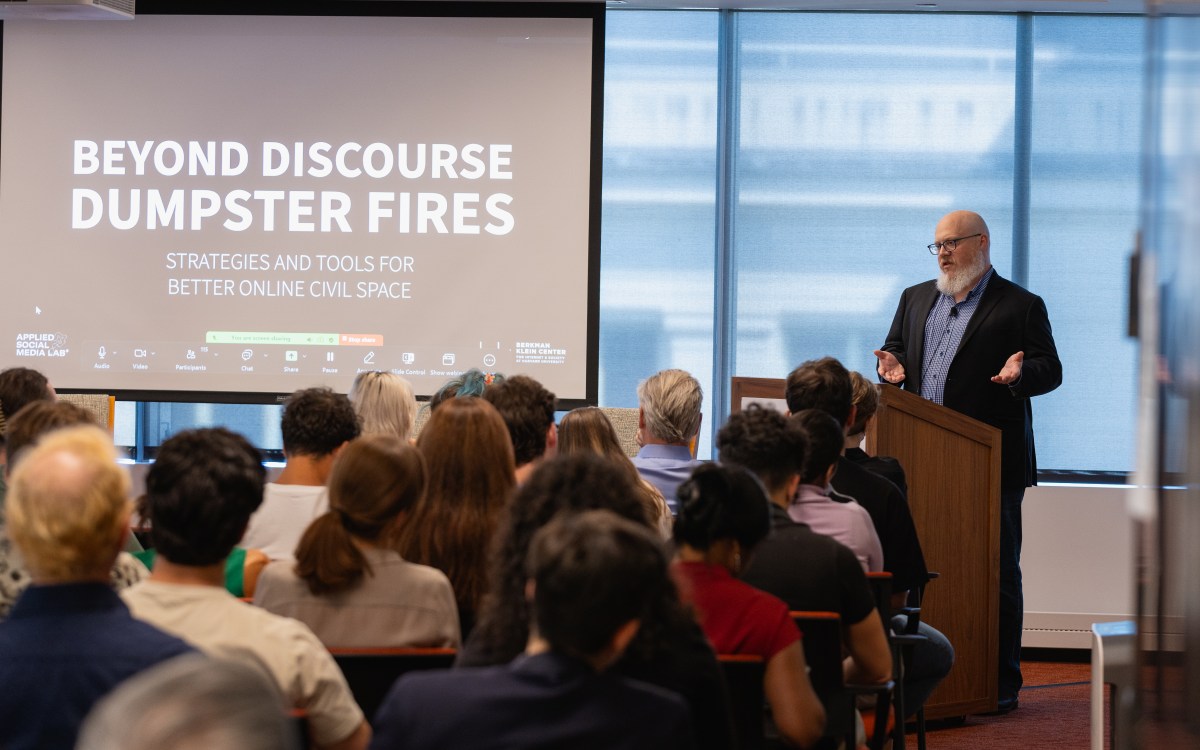
How to make social media, online life less of ‘dumpster fire’

Harvard & the Legacy of Slavery Initiative announces advisory council and memorial co-chairs
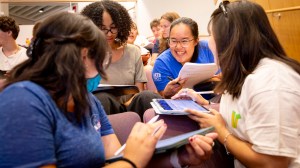
Unfolding the academic year
How i wrote my harvard essay.
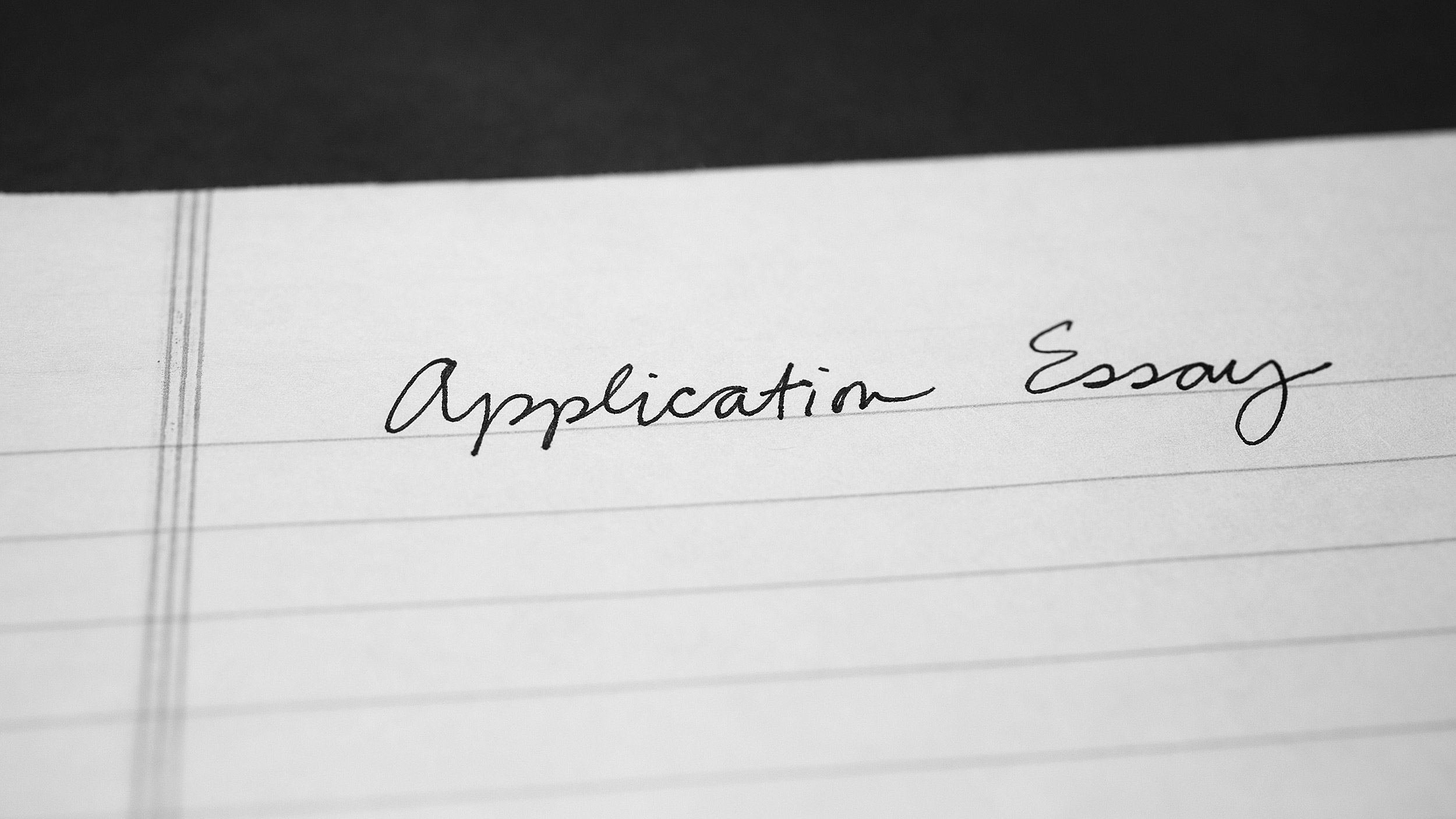
Photos by Stephanie Mitchell/Harvard Staff Photographer
Manisha Aggarwal-Schifellite
Harvard Staff Writer
First-years recount the agony and the ecstasy
Late nights. Discarded drafts. That one great idea. Most high school seniors would agree that the admissions essay is the hardest part of a college application. The Gazette asked first-year students to reflect on theirs — the writing, the inspiration, the hand-wringing — and the lessons learned.
Share this article
Louisville, Ky.
I stayed up really late at first, when my inhibitions were down, so I could write without being self-critical and brainstorm ideas. I probably went through 20 ideas, narrowed them down to five, wrote drafts of five, and then picked one and edited and edited and edited until I finished. All of the days writing the essay were stressful. I wrote about the transition from independence to interdependence and my personal growth that was catalyzed by my parents’ divorce. I reflected on my early independence as a child and how that transitioned to me depending on other people, working together in teams, and leading people to accomplish important things in our community.

“I stayed up really late at first, when my inhibitions were down, so I could write without being self-critical and brainstorm ideas.”
Nick Nocita
Arlington Heights, Ill.
I distinctly remember writing my Harvard essay at Thanksgiving on my phone. The inspiration just came in waves while I was spending time with my family. I talked about my grandmother, who passed around five or six years ago. She was someone who really influenced me in terms of seeing what one can do with a selfless attitude. She had only ever earned a high school education, and she didn’t have the opportunity to go beyond that. Seeing what someone can do with a high school education was amazing for me, to think about what I could do with the power of a prestigious college education. It was such an inspiration that I immediately wanted to start writing about her. My family was watching a football game, and I was pumping out this essay.

“The inspiration just came in waves while I was spending time with my family.”
Divya Amirtharaj
Portland, Ore.
There were a couple of weeks when I was sitting in front of my laptop and getting nothing. But once I figured out what I wanted to write, it was fast; in a day, I was done. In one of my essays, I wrote about growing up in a predominantly white area and a skin condition that I have called vitiligo. I wrote about how those things impacted my identity as an Indian woman. In another, I wrote about how I went from competitive swimming, to lifeguarding, to teaching lessons, to starting a program for free swim lessons for underprivileged kids in my area. It was interesting to go back at the end and see what I had written, summing up my entire life for 17 years.
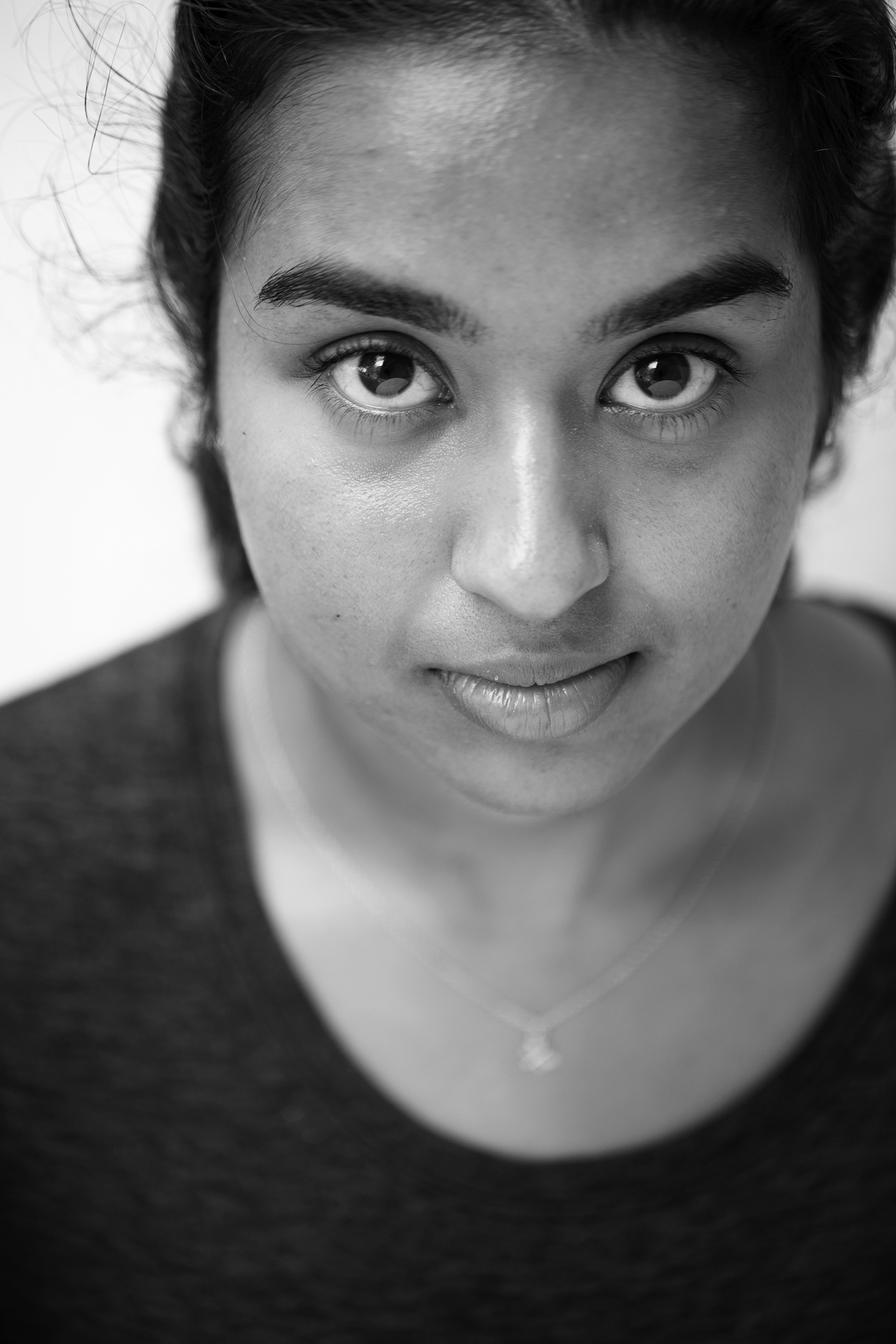
“It was interesting to go back at the end and see what I had written, summing up my entire life for 17 years.”
Sophie Clivio
Kingston, Jamaica
I did submit my essay with a typo! I wrote it on Google Drive and made a comment to myself and a reference to switching something around. It’s at the bottom of my essay, and I didn’t realize until yesterday. I also wrote the essay as kind of a spoken-word poem. How many people have done that? I did not want to do the whole paragraph thing. I wrote about the culture shock I experienced moving from Jamaica to Milton, Mass., to attend boarding school, in terms of race and identity, because I’m a mixed-race person. I was really happy with the essay. It was very emotional to write, and I felt like a huge weight had been lifted off my shoulders when I finished it. The typo was disappointing, but it’s fine! I’m here!
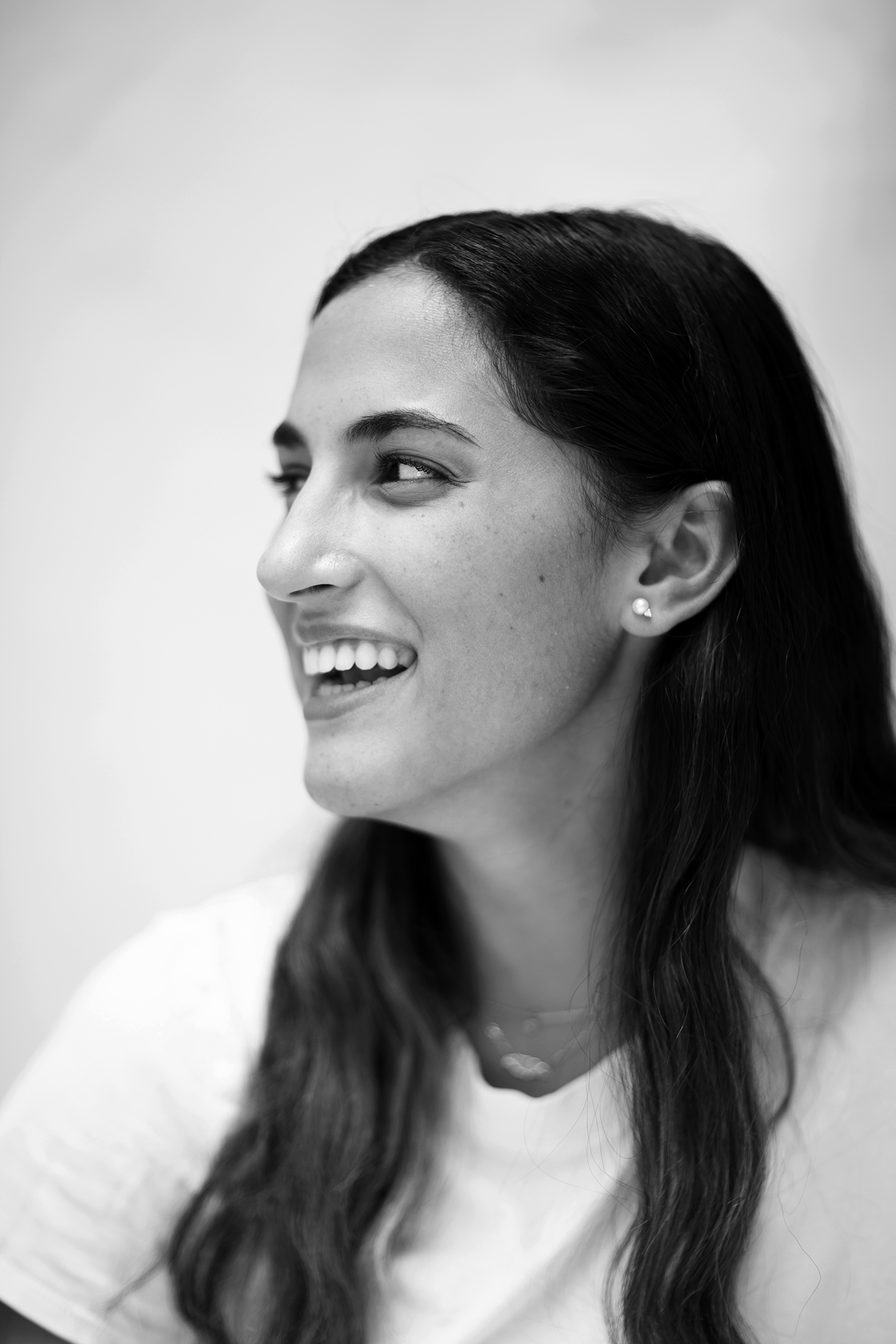
“I wrote the essay as kind of a spoken-word poem.”
Marcus Miller
For my essay, I wrote about being an athlete and finding your way after athletics by applying yourself in school. In eighth grade, I broke my femur, and I wrote about overcoming that. Then in my senior year of high school I tore my UCLs in both hands playing football. [That experience] brought me back to the process of rehabbing through injury. My essay was about finding your identity afterward. I’m more of a math and numbers guy, and I probably went through three or four ideas before I found this one.

“I’m more of a math and numbers guy, and I probably went through three or four ideas before I found this one.”
Kylie Simms
Travelers Rest, S.C.
I wrote about living in Milan when I was younger and how it opened my eyes to other perspectives and taught me not to be so quick to judge other people. In middle and high schools, I lived back in my small town in the U.S. and missed those interactions that helped me grow, so I also wrote about wanting to attend Harvard because I wanted to experience those different perspectives again. I didn’t edit my essay a lot because I wanted it to sound authentic and like my voice. I didn’t want to go through and replace all the words with fancier words. I wanted to sound like a person.

“I wanted it to sound authentic and like my voice.”
Alexander Park
Belmont, Mass.
I had just gotten out of the shower and thought, “Oh, I got this.” I remembered this anecdote of me sitting in the back of my grandfather’s car in Korea, and he was telling me about when Korea was a kingdom and about these kings from the Chosun dynasty. It was really interesting learning about this history that I wasn’t able to learn in America from somebody who was super-knowledgeable and cared a lot about it. I remember my sister was leaning on me, and we were driving on the highway. It was very calming and peaceful. So, I wrote about my love for history and my love for listening to stories. A lot of people say that you have to write down your entire life story in however many words you’re given, but you can highlight one really essential aspect of your identity. Telling a story about that is much more compelling than trying to fit everything in.
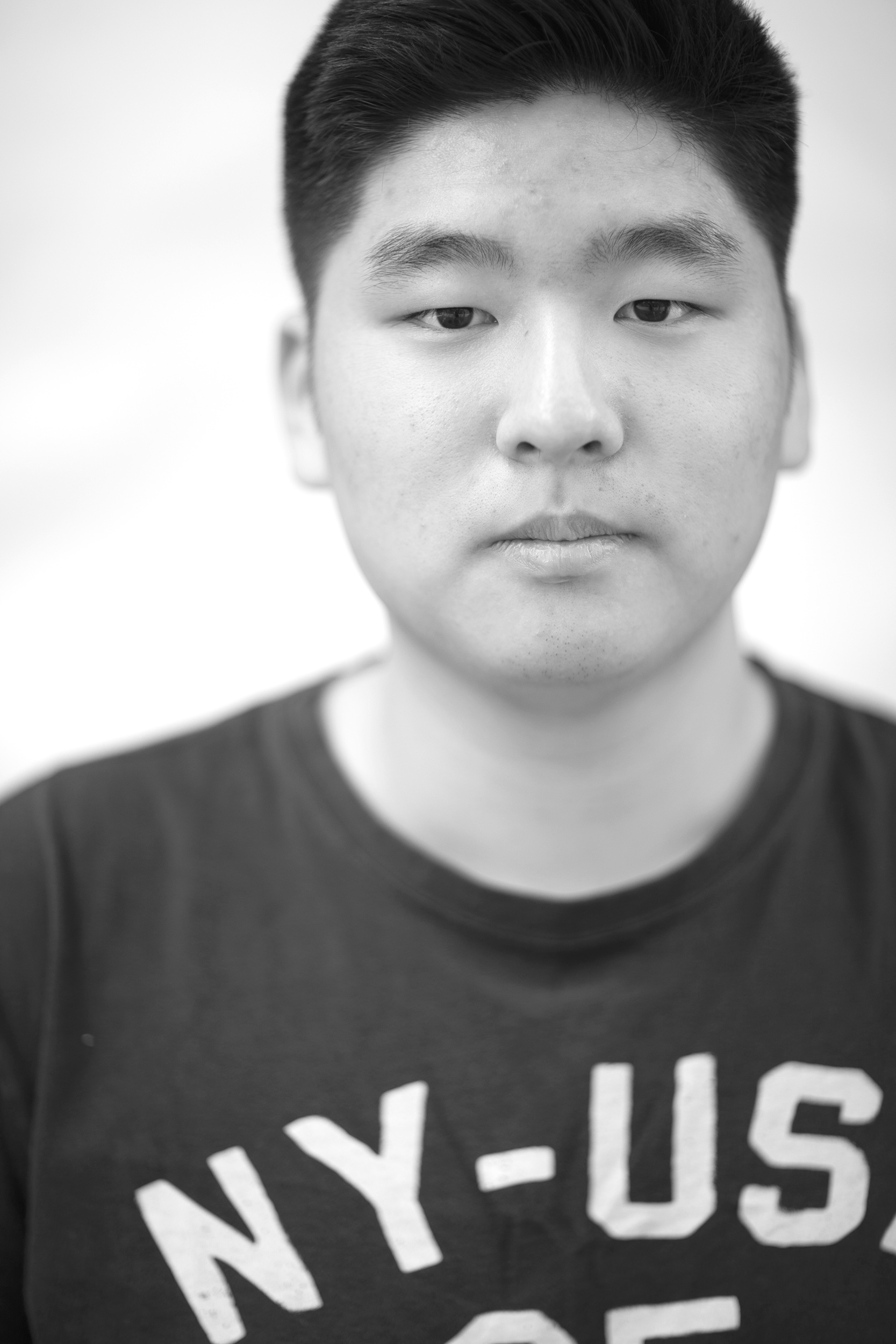
“Telling a story about that is much more compelling than trying to fit everything in.”
Nayleth Lopez-Lopez
When I started middle school, my mom went back to college. She emigrated from Venezuela and worked in her own convenience store for 17 years. When she started college, I took on the role of helping her edit her essays. In my essay, I wrote about asking for help and how she inspires me to ask for help, because she had the courage to ask her young daughter for help. It was so emotional to write. The first time I asked my mom to read it, I freaked out because she said she didn’t know if she liked it. She thought it was too much about her. But I think it all turned out OK.

“I wrote about … how [my mother] inspires me to ask for help, because she had the courage to ask her young daughter for help.”
More like this
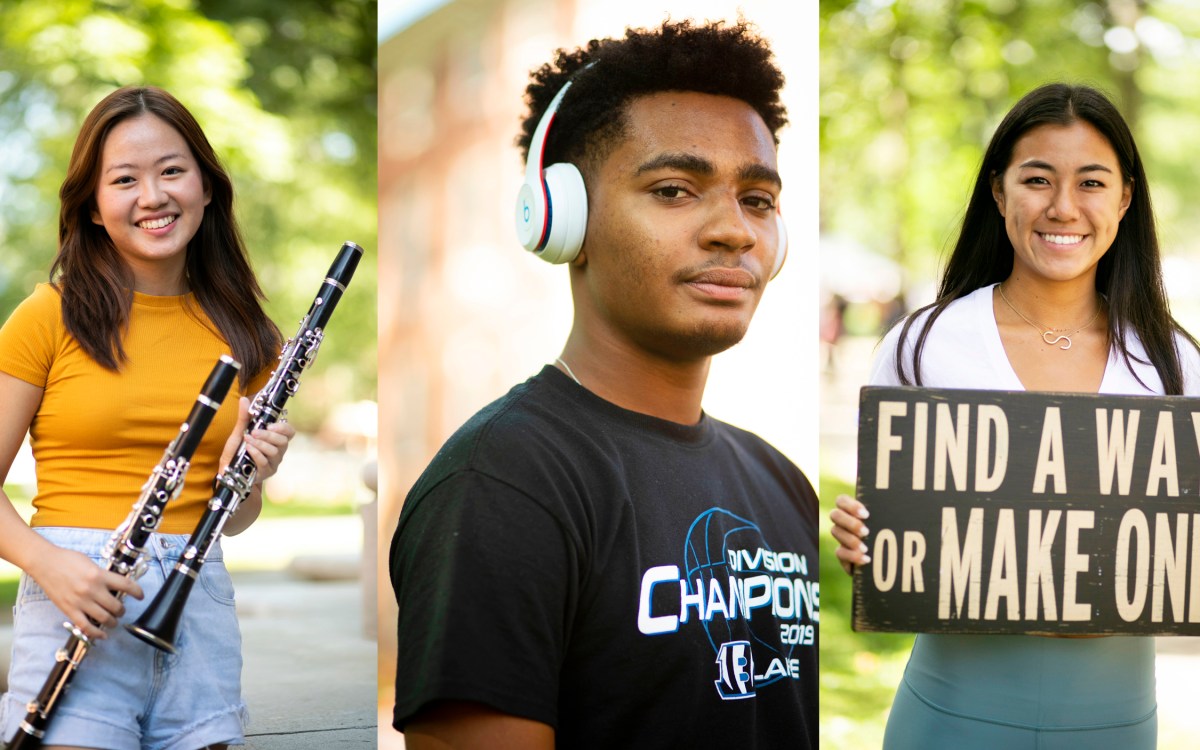
Their favorite things
You might like.
A panel led by Berkman Klein Faculty Director Jonathan Zittrain discusses the mess of social networks and how to fix it.

University looks to build on initial steps to engage community, develop enduring partnerships
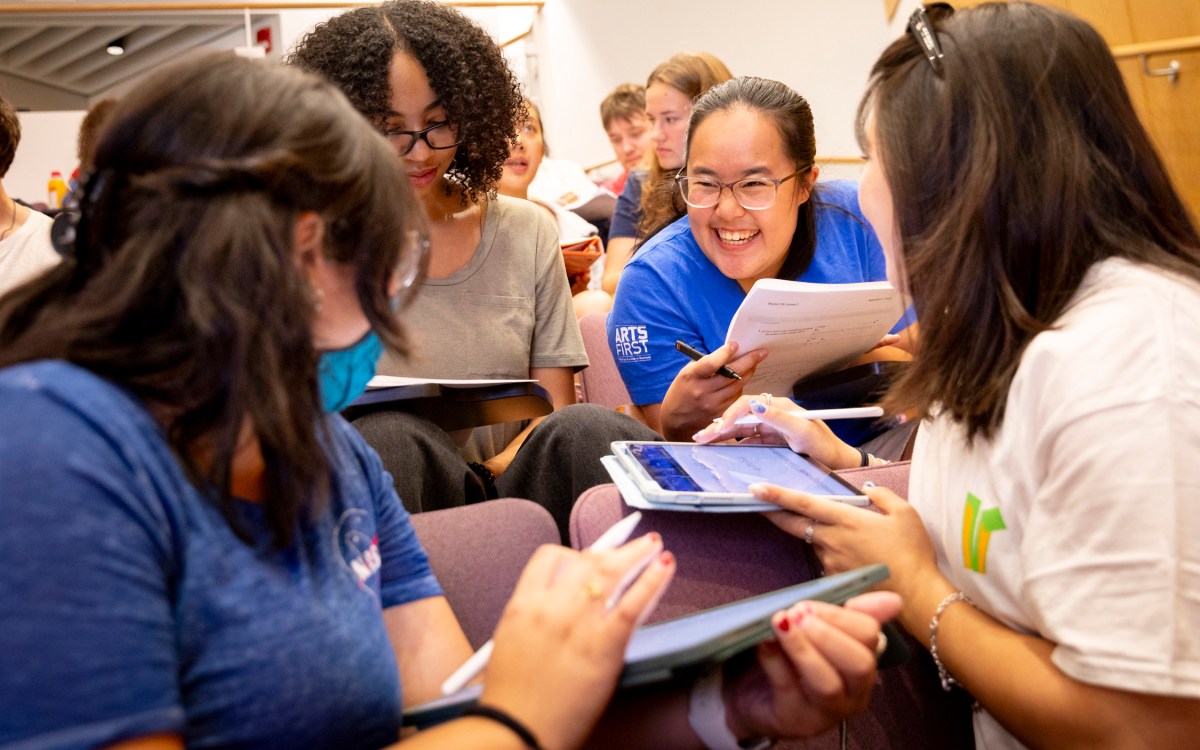
Students sample classes across campus, offering them a taste of what lies ahead
Harvard releases race data for Class of 2028
Cohort is first to be impacted by Supreme Court’s admissions ruling
Parkinson’s may take a ‘gut-first’ path
Damage to upper GI lining linked to future risk of Parkinson’s disease, says new study
High doses of Adderall may increase psychosis risk
Among those who take prescription amphetamines, 81% of cases of psychosis or mania could have been eliminated if they were not on the high dose, findings suggest
What are your chances of acceptance?
Calculate for all schools, your chance of acceptance.
Your chancing factors
Extracurriculars.
Harvard University Essay Example

Harvard University is a highly-selective school, so it’s important to write strong essays to help your application stand out. In this post, we’ll share an essay a real student has submitted to Harvard. (Names and identifying information have been changed, but all other details are preserved).
Please note: Looking at examples of real essays students have submitted to colleges can be very beneficial to get inspiration for your essays. You should never copy or plagiarize from these examples when writing your own essays. Colleges can tell when an essay isn’t genuine and will not view students favorably if they plagiarized.
Read our Harvard essay breakdown to get a comprehensive overview of this year’s supplemental prompts.
Prompt: Travel, living, or working experiences in your own or other communities
A scream in the night.
In the town of Montagu, South Africa, the sun had set hours ago, leaving its place to a deep dark sky. Everything was peaceful and quiet. In a little lodge, a family of four people had just finished eating on a dimly lit terrace. The heat was so intense even the black silence seemed to suffocate – only a few crickets dared to break its density. The mother asked something to her daughter, who stood up, and bypassed the table. That’s when she screamed. An intense, long scream, that reverberated in the little town of Montagu.
How do I know that? It was me.
Me, miserable as I had fallen down the terrace… into a plantation of cacti! I couldn’t move. I felt as if each cactus thorn contained poison that spread through my back, my arms, my entire body. The plants were engulfing me into the darkness. I was suffocating, trying to grasp some of the hot, heavy air. Until I felt her hand. My mom’s.
She and my father organized this trip to South Africa. Valuing experiences more than material wealth, they liked to organize trips to foreign, far away countries. In addition to South Africa, I visited Cuba, Nepal and China. Four countries where landscapes and cities are dissimilar to France’s. Four countries that allowed me to discover numerous communities, recipes and traditions. Four countries where I met animals, plants and humans I had never seen before.
I am a city girl. As a little girl, I was never really fond of flora or fauna. However, during my trips, I was lucky to see animals in freedom and to interact with nature. A baboon broke into my car in South Africa and walked all over me – literally. I held an iguana in Cuba, did a safari in South Africa and talked with a parrot in Nepal. I saw the sun rising on the Machapuchare. I ultimately understood that all I had experienced was thanks to Nature. I realized its preciousness and its urgency to be saved. I gained proximity to the environment that I had always lacked. My blood turned green thanks to travels.
In addition to animal discoveries, travels are encounter engines. From little to aged humans, from all genders, from everywhere, travels allowed me to meet incredible people. The uncanny apparition of a mysterious little girl particularly touched me in Ghorepani, Nepal. I had walked for seven hours that day, and was waiting for dinner, sitting on a bench. She slowly advanced towards me.
“What’s your name?” I asked the white figure in the obscurity.
The little girl stopped moving. Dark curly hair, dark deep eyes, white clothes covered in mud among the deep dark night. Our eyes locked in each other’s, the sound of our breathing floating in the dense silence, everything seemed to be suspended. After what felt like dozens of hours, she looked at me and silently walked away, a star in the ink black sky.
Every person encountered made me grow. Some like the Nepalese little girl simply disrupted me, some opened my eyes on poverty, others opened my eyes on racism. Every person I met had a story to share, a fact to transmit. I visited an orphanage in a township in South Africa. The teacher, a frail and tiny woman, explained that racism was still so profound in the country that black and mixed race people were fighting to death in the neighbourhood. Centuries of abuse towards people of color, for children to pay the price, growing up parentless in the orphanage. The sound of the rain was echoing on the metal houses as the children sang their anthem. Wet furrows appeared as raindrops were racing on every cheek:
‘Let us live and strive for freedom,
In South Africa our land.’
Traveling is ultimately a chance. It is an opportunity to understand the complexity of the world by getting close to it. Traveling allowed me to realize the differences between each country and region. But beyond those dissimilarities, I saw singing, dancing and laughing everywhere in the world. Being away brought me closer to my home and my family and friends, my newspaper team, every community I’m involved in. Traveling represents a learning process. I integrated leadership and diligence in Nepal, watching children and old men transport wood on their back. Speaking foreign languages allowed me to acquire experience and put my theoretical skills to practise. I acquired a lot of adaptability through travels as part of their greatness comes from its unpredictability. Traveling truly enriches the intellect of those who have the chance to do it.
What the Essay Did Well
This is overall a delightful, very readable essay. The author starts with a dramatic hook to capture the reader’s attention, and they build on that initial story with vivid imagery like “ I felt as if each cactus thorn contained poison that spread through my back, my arms, my entire body.” In general, the language is strong throughout the entire essay. Other beautiful gems include, “The sound of the rain was echoing on the metal houses as the children sang their anthem” and, “The uncanny apparition of a mysterious little girl particularly touched me.” The author has a way with words, and they proudly demonstrate it in their response.
In addition to strong imagery, the author also does a satisfactory job at answering the prompt. The open-ended question not only means that students could answer in a variety of ways, but also that it might be easy to fall into a trap of answering in an unrelated or uninteresting manner. The author here does a good job of directly answering the prompt by providing clear examples of their travels around the world. Their response also goes beyond merely listing experiences; rather, they tell stories and describe some of the notable people they have met along the way. By telling stories and adopting a whimsical tone that evokes the wanderlust of travel, they elevate the impact of their response.
We also learn a fair amount about the author through their stories and personal reflections. We see that they are concerned about social justice through their retelling of the interactions in South Africa. We see them reflecting on the universal joys of singing and dancing: “ But beyond those dissimilarities, I saw singing, dancing and laughing everywhere in the world.” In the closing paragraph, we learn that they are adaptable and willing to undergo lifelong learning. Thus, another reason this essay shines is because it not only tells us what travels/experiences the author has engaged in, but it provides deeper introspection regarding how they have grown from these experiences.
What Could Be Improved
While the essay is beautiful, and the fast-moving pace matches the feeling of seeing unfamiliar places for the first time, the narrative runs the risk of being too wide-ranging. The introductory story of falling onto a bed of cacti could warrant an entire essay unto itself, yet the author does not return to it anywhere else in their response. They missed an opportunity to bring the response full circle by ruminating on that once more in their conclusion.
Another thing to be careful of is how the privilege inherent in international travel might cause the author to see the life through a certain lens. Although they remark upon how their family prioritizes experiences over material wealth, the fact is that extensive international travel relies on having material wealth to pay for costs like airfare and housing. It is important to demonstrate humility and awareness of privilege when responding to college essay prompts, and this is no exception.
Where to Get Your Harvard University Essays Edited
Do you want feedback on your Harvard University essays? After rereading your essays countless times, it can be difficult to evaluate your writing objectively. That’s why we created our free Peer Essay Review tool , where you can get a free review of your essay from another student. You can also improve your own writing skills by reviewing other students’ essays.
If you want a college admissions expert to review your essay, advisors on CollegeVine have helped students refine their writing and submit successful applications to top schools. Find the right advisor for you to improve your chances of getting into your dream school!
Related CollegeVine Blog Posts

Important Addresses

Harvard College
University Hall Cambridge, MA 02138
Harvard College Admissions Office and Griffin Financial Aid Office
86 Brattle Street Cambridge, MA 02138
Social Links
If you are located in the European Union, Iceland, Liechtenstein or Norway (the “European Economic Area”), please click here for additional information about ways that certain Harvard University Schools, Centers, units and controlled entities, including this one, may collect, use, and share information about you.
- Application Tips
- Navigating Campus
- Preparing for College
- How to Complete the FAFSA
- What to Expect After You Apply
- View All Guides
- Parents & Families
- School Counselors
- Información en Español
- Undergraduate Viewbook
- View All Resources
Search and Useful Links
Search the site, search suggestions, the personal essay.
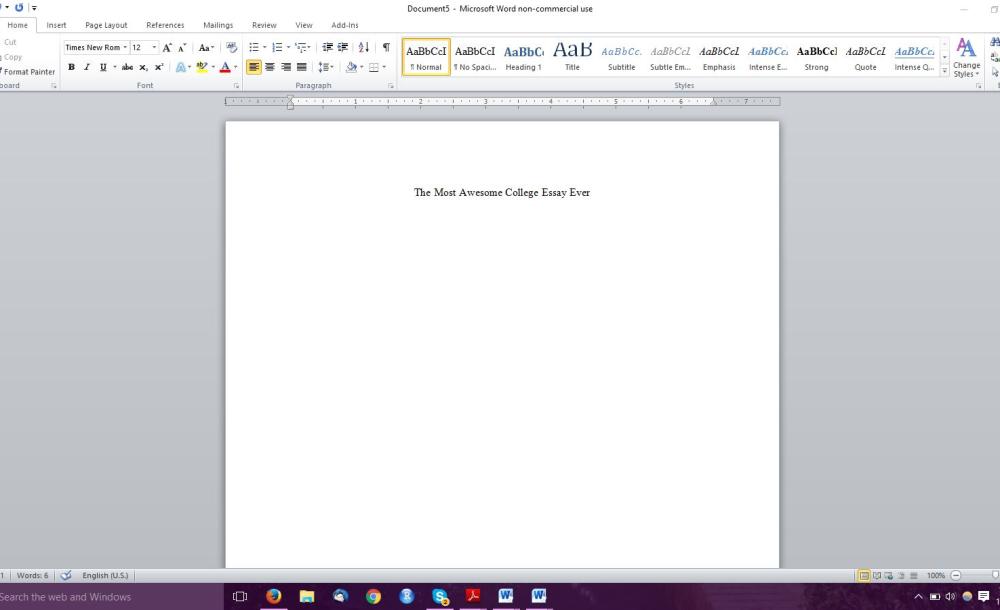
Unlike the rest of your application, which primarily consists of filling in boxes, the personal essay gives you the freedom to essentially write about whatever you want. No rules! Show who you are! Which sounds pretty cool, until you’re sitting there looking at a blank Word document.
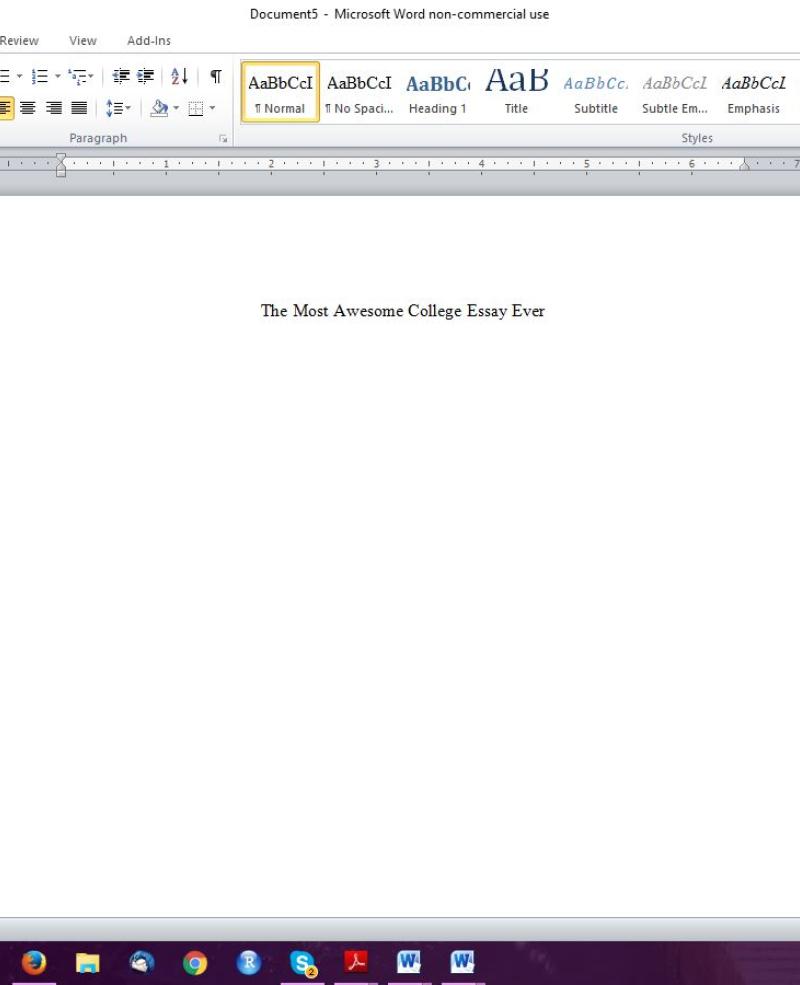
While the personal essay is a great opportunity to infuse your voice into the application, I think some people (cough, me, cough) can get overwhelmed by it to the point where they don’t know how to begin. What do I write about? What makes me stand out? How can I explain all of this in only a few hundred words?
Well, as someone who eventually managed to get some words down on that blank document and turn out a decent college essay, here are a few words of advice.
1. Start by writing something.
I know, that sounds really obvious. But sometimes the hardest part of writing is just getting started – if you spend too much time criticizing your ideas before you write anything down, you won’t get anywhere. Write a few sentences, jot down some random ideas, note a couple anecdotes that might be interesting… just get something on paper that you can look back to. Maybe one of those ideas will catch, and BOOM you have an essay – or maybe you’ll look back to this list after a few weeks and think of something else that you would rather write about. That’s fine! The beginning of the creative process involves coming up with ideas, judging them comes later. Trust me, I took a class on this (really: it was a psych class called “Creativity: Madmen, Geniuses, and Harvard Students.”)
2. Think about something that has some significance to you.
Many students feel like they have to write about some huge, life-changing, important event in their lives. If you have something like this that you want to write about, that’s great! However, you can also write an awesome essay about something other than The Most Important Thing Ever. It can be the littlest things, if you explain their significance well, that actually stand out. In my case, somewhere in my essay I mentioned that I got up at 5:37am (rather than 5:30 or 5:45) because I liked prime numbers – and the first thing my admissions officer said when I walked into the room for my interview was, “So, prime numbers, huh?” That being said, remember that this is a college essay, so keep this audience and goal in mind as you write. When they finish reading, what do you want the admissions officers to know about you? Does this essay demonstrate something about who you are and what you care about? If not, you might want to go back to the drawing board.
3. Don’t be afraid to start over.
After finishing my first draft, I was glad to have something, but I wasn’t completely happy with it either. A week or two later, as I was reading over my essay again, I had an idea for a totally different topic - so I opened another document and completely started over. The second attempt was so much better, and I felt happy with how it turned out. It can be hard to scrap an initial attempt after spending so much time on it, but think of that time as just part of the process of getting to what you really want to write about.
4. Get an outside perspective.
One of the most useful things I did while working on my college essay was asking a couple people to read it over. At the time, I had two drafts that I was choosing between, and I wasn’t sure which one captured “me” better. When I asked my parents and teacher what they thought, they unanimously picked one option over the other. In the end, it’s important to have an essay that you are happy with – but sometimes having a fresh set of eyes can help you see what that is.
This is an important step! Both you, and perhaps someone who knows you well, should read over your essay and make sure it is in tip-top shape before you turn it in. There should be no grammatical or spelling mistakes – that gives the impression that you did not take your time on it. I know you’ve spent a long time on it by this point, but those last edits are super important!
The personal essay is a snippet of who you are and where you’re coming from – a snapshot for the admissions officers to look at as they read your application. It will never be able to capture everything about you, but you want to make sure that you’re giving them your best angle. So sit down, smile, and get to writing!
Halie Class of Alumni

Student Voices
Dear homesick international student at harvard college.
David Class of '25

My Harvard Monomyth
Denzel Class of '24

Applying to Engineering Fellowships?


Choose Your Test
- Search Blogs By Category
- College Admissions
- AP and IB Exams
- GPA and Coursework
How to Write the Perfect Harvard Essay: 3 Expert Tips
College Info , College Essays

Aiming for the world-renowned Harvard University? As part of the application to this prestigious Ivy League school, you'll be required to submit responses to five short answer questions.
This is actually a big change! In years past, Harvard offered an optional supplemental essay opportunity that applicants could write to add extra flair to their application. This year, Harvard has opted to require responses to five short answer prompts and completely omitted the optional, supplemental Harvard essay prompt.
But what should you write about for your Harvard essay short answers? What are the different Harvard essay prompts to choose from, and how should you answer them so you can give yourself your best shot at getting in?
In this guide, we give you advice for each Harvard essay prompt as well as tips on how to decide what to write. But before we look at the prompts, let's go over what Harvard actually requires in terms of essays.
Feature Image: Gregor Smith /Flickr
What Essays Do You Need to Submit to Harvard?
Those applying for admission to Harvard must submit an application through either the Common Application or the Coalition Application . For your Harvard application, you'll need to write a personal essay in response to one of the prompts provided by the Common App or Coalition App (depending on the system you're applying through).
This essay is required for all applicants and should typically be about 500-550 words long (and must be less than 650 words). To learn more about this essay, check out the current prompts for the Common App and Coalition App on their official websites.
In addition to this required essay, Harvard first-year applicants are required to submit 250 word (max) responses to five short answer questions .
Here are the prompts for the five required 2023-2024 Harvard short answer questions :
Harvard has long recognized the importance of enrolling a diverse student body. How will the life experiences that shape who you are today enable you to contribute to Harvard?
Briefly describe an intellectual experience that was important to you.
Briefly describe any of your extracurricular activities, employment experience, travel, or family responsibilities that have shaped who you are.
- How do you hope to use your Harvard education in the future?
- Top 3 things your roommates might like to know about you.
Now, you might be wondering: is Harvard offering an optional supplemental essay opportunity as part of this year’s application process? No. This year, Harvard is not accepting optional supplemental essays as part of the first-year admissions process . The optional supplemental essay has been offered in previous years, but not for the 2023-2024 admissions cycle.
Now, here’s where things get a little tricky. The five short answer questions listed above are part of what’s called the Harvard first-year application supplement. But they aren’t the same thing as the supplemental essay from years past! And the important thing to remember is this: these short answer questions–and the entire Harvard supplement–are not optional. You’ll have to answer all five questions if you want to be considered as a candidate for admission!
The good news is that each short answer topic is very open ended, and they give you plenty of room to express who you are and how and why you’re the perfect fit for Harvard!

How to Write the Harvard Short Answers: Every Prompt Analyzed
In this section, we go through the five required Harvard supplement essay prompts and offer you tips on how to write effective, powerful short answers…in 200 words or less!
Prompt 1: Diversity
This first Harvard essay prompt is all about what you can bring to campus that will positively contribute to student diversity. Though we tend to think of race/ethnicity when using the word "diversity," you can actually interpret this word in a number of ways.
As a large and prestigious institution, Harvard strongly values students who have different and unique backgrounds and experiences, so it's important for them to admit students who embody these values as well.
This prompt is essentially a version of the diversity essay, which we talk about in more detail in our guide.
Here are some key types of diversity you can discuss (note that this is not an exhaustive list!):
- Your ethnicity or race
- A unique interest, passion, hobby, or skill you have
- Your family or socioeconomic background
- Your religion
- Your cultural group
- Your sex or gender/gender identity
- Your opinions or values
- Your sexual orientation
Tips for Answering This Prompt
- Choose a personal characteristic that's had a large impact on your identity. Don't talk about your family's religion if it's had little or no impact on how you see and define yourself. Instead, concentrate on the most significant experiences or skills in your life. If you play the theremin every day and have a passion for music because of it, this would be a great skill to write about in your essay.
- Be clear about how your unique characteristic has affected your life and growth. You don't just want to introduce the experience/skill and leave it at that. How has it molded you into the person you are today? How has it influenced your ambitions and goals?
- Be sure to tie this characteristic back to the diversity at Harvard. Basically, how will your experience/skill/trait positively influence the Harvard student body? For example, if you come from a specific cultural group, how do you believe this will positively impact other students?

Prompt 2: Important Intellectual Experience
With this prompt, Harvard wants you to focus on an intellectual or learning experience that's had a big impact on you in terms of your personal growth, your academic/intellectual interests and passions, the field of study you want to pursue, etc.
This intellectual experience could be anything that's intellectually stimulating, such as an essay or book you read, a poem you analyzed, or a research project you conducted.
Note that this experience does not need to be limited to something you did for school —if you've done anything in your spare time or for an extracurricular activity that you think fits this prompt, feel free to write about that.
For example, you could write about how you found an old copy of Charles Darwin's On the Origin of Species at a garage sale, and how reading this prompted you to develop an interest in biology, which you now intend to major in and eventually make a career out of.
This is also an ideal prompt to highlight a particular interest or passion you have that differs from the academic field you want to study in college.
For instance, perhaps you're applying for admission as a computer science major, but you're also a huge fan of poetry and often take part in local poetry readings. Writing about a poem you recently read and analyzed could illuminate to the admissions committees a different, less prominent side of your personality and intellectual interests , ultimately showing that you're open minded and invested in gaining both new skills and experiences.
- Choose an experience that had a significant impact on you . Don't talk about how reading Romeo and Juliet in eighth grade made you realize how much you enjoyed writing plays if you were already writing plays way before then! Pinpoint an intellectual experience that was meaningful to you, and write about it honestly.
- Be specific about the intellectual experience you had and clearly relate it back to your strengths and interests . In other words, what kind of impact did this experience have on you? Your academic goals? Your future plans? For example, instead of writing about how a scientific paper on climate change made you think more deeply about the environment, you could talk about how this paper prompted you to form a recycling program at your school, take a class on marine biology, and so forth.

Prompt 3: Non-Academic Defining Experiences
This prompt is asking you to discuss experiences you've had that involved traveling, living, learning, and/or working in some capacity outside of the formal classroom. Most importantly, you’ll need to explain what kind of effect that experience has had on you.
Here are examples of experiences you could talk about for this essay:
- Any extracurricular activity you engage in, particularly a spike approach, if you’ve got one (learn more about creating your spike approach in our complete guide !)
- Living or traveling abroad
- Moving to a new place or living in multiple places
- Working a part-time job
- Working a temporary job or internship somewhere outside your own community
- Helping with finances, caregiving, or maintaining a family business (like a farm or lawn care business, for example)
- Choose a truly significant experience to talk about. Although your experience doesn't need to be life-changing, it should have had a noteworthy impact on you and who you've become. If, for example, you traveled to Mexico with your family but didn't really enjoy or learn much from the trip, it's better to avoid writing about this experience.
- Make sure to talk about how this travel/living/work experience has affected you. For example, say you spent a couple of summers in high school visiting relatives in South Africa. You could write about how these trips helped you develop a stronger sense of independence and self-sufficiency—traits which have made you more assertive, especially when it comes to leading group projects and giving speeches.
- Don't be afraid to get creative with this essay. For instance, if you lived in a country where you at first didn't understand the local language, you could open your Harvard essay with an anecdote, such as a conversation you overheard or a funny miscommunication.

Prompt 4: Harvard and Your Future
This Harvard essay prompt is pretty self-explanatory: it wants you to discuss how you intend to use your education at Harvard after you graduate—so in a future job or career, in grad school, in a particular research field, etc.
Basically, how will your college education help you achieve your future goals (whatever those may be)?
If you’re still undecided about the field(a) you want to study at Harvard, don’t panic! It’s okay to think outside the box for this prompt.
Maybe you don’t know what you want to major in yet, but you do know that you share Harvard’s values and want to bring those values to the world after you graduate. Whether you’ll do that by joining the Peace Corps or heading back to your hometown to volunteer for a few months before starting your career, just be specific about how Harvard is the right school to put you on the path to your future!
- Be careful when talking about your future goals. You don't want to come off too idealistic, but you also don't want to sound too broad or you'll come across unfocused and ambivalent. Try to strike a balance in how you discuss your future dreams so that they're both attainable and specific.
- Clearly connect your goals back to your current self and what you've accomplished up until this point. You want to make it clear that your goals are actually attainable, specifically with a Harvard education. If you say you hope to start your own interior design business after graduation but are planning to major in biology, you're only going to confuse the admissions committee!
- Emphasize any ways Harvard specifically will help you attain your academic goals. For example, is there a club you hope to join that could connect you with other students? Or is there a particular professor you want to work with? Don't just throw in names of clubs and people but specifically explain how these resources will help you reach your goals. In short, show Harvard that what they can offer you is exactly what you need to succeed.

Prompt 5: Your Future Goals
How you hope to use your college education
This Harvard essay prompt is pretty self-explanatory: it wants you to discuss how you intend to use your education at Harvard after you graduate —so in a future job or career, in grad school, in a particular research field, etc.
Should You Choose This Prompt?
If you have a pretty clear vision for your future goals during and after college, this is a perfect prompt to choose for your Harvard essay.
If, on the other hand, you're still undecided about the field(s) you want to study or how you intend to use your major, you might want to choose a different prompt that's less focused on your future and more concentrated on how past events and experiences have shaped you as a person.

Prompt 6: List of Books
A list of books you have read during the past twelve months
Of all Harvard essay prompts, this one is by far the most unique.
Here, you're asked to simply list the books you've read in the past year. This essay is more than just a list, though—it's a brief overview of where your intellectual interests lie. These books may include works of fiction or nonfiction, essays, collections of poetry, etc.
Have you read a lot of diverse and interesting books in the past year? Are you an avid reader who loves dissecting books and essays? Do you enjoy a creative approach to college essays? If you answered yes to these questions, then this prompt is a perfect fit for you.
Even if you haven't read a ton of books this past year, if you were especially intrigued by some or all of what you did read, you could certainly use this prompt for your essay.
- Instead of just listing the titles of books you've read, you might want to include a short sentence or two commenting on your reaction to the book, your analysis of it, why you enjoyed or didn't enjoy it, etc., after each title. Be sure to vary up your comments so that you're highlighting different aspects of your personality. Also, don't just regurgitate analyses you've read online or that your teacher has said—try to come up with your own thoughts and interpretations.
- Don't feel the need to stick to only the most "impressive" books you read. The Harvard admissions committee wants to see your personality, not that of a pretentious applicant who claims to have only read Jane Austen and Ernest Hemingway. Be honest: if you read Twilight in a day, why not make a short joke about how addictive it was?
- Go beyond a chronological list of books. It'll be far more interesting if you list the books you read in a more unique way. For example, you could organize titles by theme or in the order of how much you enjoyed them.


Prompt 7: Honesty
The Harvard College Honor code declares that we "hold honesty as the foundation of our community." As you consider entering this community that is committed to honesty, please reflect on a time when you or someone you observed had to make a choice about whether to act with integrity and honesty.
As you can see with this quotation, Harvard strongly values honesty and integrity. Therefore, if you go with this prompt, you're essentially telling Harvard that you, too, embody a powerful sense of morality and honesty.
- Was there a specific time in your life when you had to make a difficult choice to be honest about something with someone?
- Could this incident be considered morally ambiguous? In other words, was the "right thing to do" somewhat of a gray area?
- If you didn't make the "right" choice at the time, how did you come to terms with or learn from this decision? What were the consequences, and what did this experience teach you about your own morals and how you value honesty?
- Be wary of the topic you choose to write about. Don't discuss a situation in which you did something obviously unethical or, worse, illegal. These types of situations are very black and white and therefore don't pose much of a moral dilemma. Additionally, talking about such an experience might make you seem dishonest and immoral, which you absolutely do not want Harvard to think about you!
- Try to find a topic that isn't black and white. Choosing "gray" incidents will help emphasize why the choice was so difficult for you and also why it's affected you in this way. For example, say your friend calls you crying right before you have to leave to take the SAT. Do you skip the test to comfort your friend, or do you hang up and leave? This kind of situation does not have an evident "right" answer, making it an ideal one to use for this essay.
- You could also discuss a time when you did not make the "right" choice—and what you learned from that mistake. As long as you look closely at why you made the "wrong" choice and what this incident taught you about integrity, your essay will be interesting and relevant.

Prompt 8: Citizens and Citizen-Leaders
The mission of Harvard College is to educate our students to be citizens and citizen-leaders for society. What would you do to contribute to the lives of your classmates in advancing this mission?
This prompt might sound a little vague, but all it wants to know is how you'll have a positive impact on both your classmates and on other people after graduation. Put simply, what kind of leader/citizen will you be at Harvard? After you graduate from college and enter the real world?
This prompt is similar to Prompt 5 in that it wants to know what kind of person you'll become after you leave college and how you'll positively influence society.
If you're a natural-born leader and have had at least a few significant experiences with leading or facilitating things such as club activities, field trips, volunteer efforts, and so on, then this Harvard essay prompt would be a great fit for you.
- Focus on a time when you led others and it resulted in a positive outcome. For instance, you could write about your position as team captain on your school's soccer team and how you would gather your teammates before each game to offer words of encouragement and advice on how to improve. You could then describe how your team began to perform better in games due to clearer communication and a stronger sense of sportsmanship. Make sure to answer the critical question: how did you lead and what ultimately made your leadership style successful?
- Discuss what kind of role your leadership skills will have at both Harvard and after you graduate. The prompt is asking about your classmates, so you must specifically address how your leadership skills will contribute to the lives of your peers. How will your past experiences with leading help you approach group projects, for example? Or clubs you join?
- Make sure to mention how you'll be a good citizen, too. By "citizen," Harvard essentially means a productive member of both the school and society in general. Basically, how have you contributed to the betterment of society? This is a good place to talk about experiences in which you played a crucial supporting role; for instance, maybe you helped out with a local volunteer initiative to feed the homeless, or maybe you joined a community project to build a new park in your town.

Prompt 9: Taking Time Off
Each year a substantial number of students admitted to Harvard defer their admission for one year or take time off during college. If you decided in the future to choose either option, what would you like to do?
Here, you're being asked what you plan to do with your time if you decide to defer your admission to Harvard or take time off during college. For example, will you travel the world? Work a full-time job? Do an internship? Take care of a sick relative?
Obviously, Harvard doesn't want to read that all you're going to do is relax and play video games all day, so make sure to think carefully about what your actual plans are and, more importantly, how these plans will benefit you as a person and as a student.
Only choose this Harvard essay prompt if you're pretty certain you'll be taking time off from college at some point (either before or during) and you have a relatively concrete idea of what you want to do during that time.
- Be specific and honest about your plans. While many students like to take time off to travel the world, you don't just want to write, "I plan to backpack Europe and learn about cultures." Think critically about your desires: why do you want to do this and how will this experience help you grow as a person? Don't just reiterate what you think Harvard wants to hear—be transparent about why you feel you need this time off from school to accomplish this goal.
- Be clear about why you must do this at this particular time. In other words, why do you think this (i.e., before or during college) is the right time to do whatever it is you plan to do? Is it something you can (or must) do at this exact time, such as a one-time internship that won't be offered again?

Prompt 10: Diversity
Harvard has long recognized the importance of student body diversity of all kinds. We welcome you to write about distinctive aspects of your background, personal development or the intellectual interests you might bring to your Harvard classmates.
This final Harvard essay prompt is all about what you can bring to campus that will positively contribute to student diversity. Though we tend to think of race/ethnicity when using the word "diversity," you can actually interpret this word in a number of ways.
This prompt is essentially a version of the diversity essay , which we talk about in more detail in our guide.
The main question to ask yourself before choosing this prompt is this: do you have a unique background or interest you can write about?
If any of these topics stand out to you and you can easily come up with a specific characteristic or experience to discuss for your essay, then this is a solid prompt to consider answering.
- Be clear about how your unique characteristic has affected your life and growth. You don't just want to introduce the experience/skill and leave it at that. How has it molded you into the person you are today? How has it influenced your ambitions and goals?

A Real Harvard Essay Example
Our resident full SAT / ACT scorer and co-founder of PrepScholar, Allen Cheng , applied to, got into, and attended Harvard—and he's posted his own Harvard supplement essay for you to look at. You can read all about Allen's essay in his analysis of his successful Harvard application .
Allen describes his essay as "probably neutral to [his Harvard] application, not a strong net positive or net negative," so it's important to note that this Harvard essay example is not representative of exactly what you should do in your own Harvard supplement essay. Rather, we're showing it to you to give you a taste of how you could approach the Harvard essay and to demonstrate the kinds of simple mistakes you should avoid.

Writing a Memorable Harvard Essay: 3 Tips
To wrap up, here are three tips to keep in mind as you write your Harvard supplement essay.
#1: Use an Authentic Voice
Having a clear, unique, and authentic voice is the key to making yourself stand apart from other applicants in your Harvard application—and to ensuring you're leaving a long-lasting impression on the admissions committee.
Therefore, write your essay in the way that comes most naturally to you, and talk about the things that actually matter to you. For example, if you love puns, throwing one or two puns into your essay will emphasize your goofier, non-academic side.
Using your voice here is important because it humanizes your application. The essay is the only chance you get to show the admissions committee who you are and what you actually sound like, so don't pretend to be someone you're not!
The only thing to look out for is using too much slang or sounding too casual. In the end, this is still a college essay, so you don't want to come off sounding rude, disrespectful, or immature.
In addition, don't exaggerate any experiences or emotions. The Harvard admissions committee is pretty good at their job—they read thousands of applications each year!—so they'll definitely be able to tell if you're making a bigger deal out of something than you should be. Skip the hyperbole and stick to what you know.
Ultimately, your goal should be to strike a balance so that you're being true to yourself while also showcasing your intelligence and talents.
#2: Get Creative
Harvard is one of the most difficult schools to get into (it only has about a 4% acceptance rate! ), so you'll need to make sure your essay is really, really attention-grabbing. In short, get creative with it!
As you write your personal essay, recall the classic saying: show, don't tell. This means that you should rely more on description and imagery than on explanation.
For example, instead of writing, "I became more confident after participating in the debate club," you might write, "The next time I went onstage for a debate, my shoulders didn't shake as much; my lips didn't quiver; and my heart only beat 100 times instead of 120 times per minute."
Remember that your essay is a story about yourself, so make sure it's interesting to read and will ultimately be memorable to your readers.
#3: Edit and Proofread a Lot
My final tip is to polish your essay by editing and proofreading it a lot. This means you should look it over not once, not twice, but several times.
Here's the trick to editing it: once you've got a rough draft of your essay finished, put it away for a few days or a week or two. Don't look at it all during this time —you want to give yourself some distance so that you can look at your essay later with a fresh perspective.
After you've waited, read over your essay again, noting any mistakes in spelling, grammar, and/or punctuation. Take care to also note any awkward wording, unclear areas, or irrelevant ideas. Ask yourself: is there anything you should add? Delete? Expand?
Once you've done this step several times and have a (nearly) final draft ready to turn in, give your essay to someone you can trust, such as a teacher, parent, or mentor. Have them look it over and offer feedback on tone, voice, theme, style, etc. In addition, make sure that they check for any glaring grammatical or technical errors.
Once all of this is done, you'll have a well-written, polished Harvard essay ready to go— one that'll hopefully get you accepted!

What's Next?
If you've got questions about other parts of the Harvard application, check out our top guide to learn what you'll need to submit to get into the prestigious Ivy League school .
How tough is it to get into Harvard? To other selective universities ? For answers, read our expert guide on how to get into Harvard and the Ivy League , written by an actual Harvard alum!
What's the average SAT score of admitted Harvard applicants? The average ACT score? The average GPA? Learn all this and more by visiting our Harvard admissions requirements page .

Trending Now
How to Get Into Harvard and the Ivy League
How to Get a Perfect 4.0 GPA
How to Write an Amazing College Essay
What Exactly Are Colleges Looking For?
ACT vs. SAT: Which Test Should You Take?
When should you take the SAT or ACT?
Get Your Free

Find Your Target SAT Score
Free Complete Official SAT Practice Tests
How to Get a Perfect SAT Score, by an Expert Full Scorer
Score 800 on SAT Math
Score 800 on SAT Reading and Writing
How to Improve Your Low SAT Score
Score 600 on SAT Math
Score 600 on SAT Reading and Writing
Find Your Target ACT Score
Complete Official Free ACT Practice Tests
How to Get a Perfect ACT Score, by a 36 Full Scorer
Get a 36 on ACT English
Get a 36 on ACT Math
Get a 36 on ACT Reading
Get a 36 on ACT Science
How to Improve Your Low ACT Score
Get a 24 on ACT English
Get a 24 on ACT Math
Get a 24 on ACT Reading
Get a 24 on ACT Science
Stay Informed
Get the latest articles and test prep tips!

Hannah received her MA in Japanese Studies from the University of Michigan and holds a bachelor's degree from the University of Southern California. From 2013 to 2015, she taught English in Japan via the JET Program. She is passionate about education, writing, and travel.
Ask a Question Below
Have any questions about this article or other topics? Ask below and we'll reply!
Harvard Essays Examples
Harvard essays examples .
One of the most important parts of the college application process is the essay section. Especially when you’re looking at applying to Harvard , or any of the Ivy League schools, your essays need to stand out. Looking at Harvard essays examples can help give you an idea of Harvard essays that worked and stood out to the admissions team.
Many students find the Harvard essays, or any school’s essays, to be the most stressful part of applying. Reading plenty of Harvard essays examples can help to alleviate that stress. Understanding strong points of Harvard essays that worked will allow you to craft the most competitive application possible.
In this Harvard Essays Example article, we’ll look at:
- The Harvard essay requirements, from topic to word count
- Various Harvard essays examples from past years
- How to approach, plan, and write the Harvard essays
- What admissions officers look for in Harvard essays
- Advice for transfer essays
Before we dive into some Harvard essays that worked, let’s understand the Harvard essay requirements.
How many essays do you have to write for Harvard?
Harvard requires applicants to complete a total of six essays: five supplemental essays and the personal statement . The personal statement prompt will be based on the application platform you are using, such as the Common Application or Coalition Application. Most students use the Common App platform and complete the Common App essay , choosing the prompt that most speaks to them.
In addition to the personal statement, students must also submit five short answer Harvard application essays. Each of these Harvard essays has a 200 word maximum. This article focuses on Harvard essays examples for those shorter essays.
What are the Harvard essay requirements?
We know that applicants are required to complete the Common App personal statement in addition to five Harvard essay prompts. Now, we’ll take a look at the current Harvard essay prompts. However, keep in mind that the Harvard essays can change. Be sure to double check the admissions site for the most up-to-date information.
Here are the current Harvard essay prompts:
Harvard University Essay Prompts
1. harvard has long recognized the importance of enrolling a diverse student body. how will the life experiences that shape who you are today enable you to contribute to harvard, 2. briefly describe an intellectual experience that was important to you. , 3. briefly describe any of your extracurricular activities, employment experience, travel, or family responsibilities that have shaped who you are., 4. how do you hope to use your harvard education in the future, 5. top 3 things your roommates might like to know about you. .
Next, we’re going to look at some Harvard essays that worked. Keep in mind that reading and analyzing Harvard essay examples can be very helpful when writing your own college essays. These Harvard essay examples, even if not for current essay prompts, can provide insights into writing outstanding essays to impress Harvard admissions.
Harvard Diversity Essay Examples
All universities want to have a diverse student body. Diversity brings unique perspectives to campus that can promote important conversations. In recent years, more and more universities have students write a diversity or community essay .
Let’s take a look at the first of our Harvard essays examples, which writes about diversity at Harvard.
Harvard has long recognized the importance of enrolling a diverse student body. How will the life experiences that shape who you are today enable you to contribute to Harvard?
I have spent most of my life living in a 41% minority town of 1.8 square miles called Highland Park, NJ. HP has convinced me that we can build institutions that are strong and united while embracing a wide variety of voices and perspectives. It has shaped my core values of diversity and inclusion. An English teacher used to encourage me to talk in front of the class by saying even if I believed my thoughts were “dumb,” I could only enrich the conversation. From my experiences debating in Model UN conferences, I have grown accustomed to being able to present viewpoints from both sides of the argument and to being able to incorporate and respect the viewpoints of all sides of an issue before making up my own mind.
At Harvard, I will seek to continue my contributions as an active participant in the community and look to actively provide unique perspectives and insights. I will actively participate in student life and engage in public service, such as helping provide after-school tutoring and joining health awareness campaigns. I look forward to a new set of unique experiences at Harvard University.
Why this essay worked
In this diversity essay, the student does an excellent job of clearly and specifically answering the prompt. The use of statistics and experiences specific to the student’s hometown makes it clear that this is no generic response. Additionally, the statistics support the student’s point that they come from a diverse community, while their examples illustrate their character.
Later, the student speaks about how they have shared their unique perspectives. While doing this, the student also shows that they are active in extracurriculars. Furthermore, they show that they are able to bring their learnings from debating in Model UN into the real world.
Finally, the student shows how they will bring diversity to Harvard’s campus. Admissions teams want to know how you’ll positively impact their campus. This student specifically states how they will be an active member of the student body and Harvard community. Clear goals and areas of interest are a common feature of successful Harvard essays examples.
Harvard Essay Example – Intellectual Experience
To get into a competitive school like Harvard University , students will need to do much more than simply meet the Harvard requirements. This is where your Harvard essays come into play. Each of the Harvard application essays should show that you are a motivated, curious person, especially the intellectual experience essay.
Now, let’s take a look at the second of the Harvard essay examples:
Briefly describe an intellectual experience that was important to you.
One of the most valuable experiences I have had was at the Rutgers University WINLAB internship. While I was moderately fluent in many programming languages like Java and C++, I rarely utilized those skills in a real-life setting. In the First Person View Self-Driving Car project, we had to code and revise programs to control the car from our computers effectively. I found the application of computing theory in this project to be much more sophisticated than I anticipated, and some model revisions that would work in theory did not produce the anticipated result.
From this experience, I realized that the real-life applications in STEM are much more sophisticated and challenging to work out than expected. From my two summers at the Harvard Summer School, I was impressed by the depth of the courses I’ve taken. In Introduction to C++ for Programmers (CSCI 3-38), we built our own games through C++ as the final project, which concurs with the highly practical nature of Harvard University’s curriculums. This gives me tremendous confidence that Harvard University is where I can learn the skills I need to prosper. I’m looking forward to new intellectual experiences at Harvard University!
The second of the Harvard essay prompts gives students a lot of room to play with their responses. An “intellectual experience” can mean many things, but it’s a great opportunity to speak to your academic interests. Harvard essays that worked have talked about everything from research experiences to mentorship to self-initiated projects. Ultimately, admissions officers should be able to see that you are driven, curious, and passionate about your topic.
In this essay, the writer shows that they have taken the time to get involved in internships within their field of interest: computer science and programming. By explaining how their experience impacted their real life, the writer shows how the intellectual experience was important to them. Specifically, this student had the important experience of realizing that some things worked in theory, however, not in practice—an important realization especially when working in the STEM field.
Remember that Harvard essays examples strive to provide a full picture of the applicant. This writer not only shares with us their interest in computer science, but also how they’ve grown. It shows that they are willing and ready to try new approaches and expand their horizons.
Harvard Extracurricular Essay Example
Within the Harvard essay requirements, you’ll notice that many of the Harvard essay prompts are similar to what you’ll find on other college applications. Among those popular prompts is the extracurricular essay . This can be a tricky one to answer in a way that isn’t cliché but demonstrates your character.
Let’s see how the third of the Harvard essays examples answers the prompt:
Briefly describe any of your extracurricular activities, employment experience, travel, or family responsibilities that have shaped who you are.
My first encounter with the Red Cross club was during the challenging COVID year, when I stepped up as a freshman and took the position of treasurer. My first blood drive experience being marked by masks, social distancing, and low turnout among donors. Needless to say, it was not the greatest first high school service experience for me, and I admittedly started to doubt if the time I spent on this front was worth it.
However, as we returned in person, things quickly turned around. As the vice president of the club, I helped recruit more than twice the club membership compared to the previous year, and our blood drives regained form; our blood targets have been exceeded every time since. Organizing and participating in blood drives has become a passion. It’s fulfilling, especially when I personally donate, to know that I’m actively serving the community and saving lives. Despite my relatively young age, I am capable of making an impact through public service. I plan to continue my commitment to the Red Cross’s adult program and participate in service programs like the Phillips Brooks House Association to serve the local Harvard community and abroad.
Similar to all of the Harvard essay prompts, this one allows students many ways to answer. The student mentions their position as vice president of the Red Cross club, which shows their capacity and willingness to take on a leadership role. They also highlighted the doubt they faced, demonstrating an instance of overcoming a challenge.
These Harvard essay prompts ask about formative experiences you’ve had beyond the classroom to demonstrate what kind of impact you’ll have on campus. This student does an excellent job of specifying the type of extracurricular activity that they plan to get involved in at Harvard: Phillips Brooks House Association. By mentioning the specific club, we know the student has done their research and knows their extracurricular interests. Furthermore, the club they choose is service-based, similar to the Red Cross club that forms the foundation of the essay.
Using Your Harvard Education Essay
In the other Harvard essays examples, students show the qualities that they will bring to campus. The fourth of the Harvard essay prompts differs in that it asks students to think about their life after college. Harvard essays that worked for prompts like this speak to both career and larger life goals.
Here is the fourth of our Harvard essays that worked:
How do you hope to use your Harvard education in the future?
I envision my education at Harvard as not just a pursuit of knowledge but also a commitment to leveraging that knowledge for meaningful impact. The diverse and collaborative nature of the Harvard community will play a pivotal role in shaping my perspective and helping me establish the strong connections needed to achieve my goals.
Whether through research initiatives or entrepreneurial ventures, I see myself at the forefront of positive and meaningful change. Harvard University’s education is sophisticated and includes many initiatives that help students including research opportunities (AM 91R & AM 99R) and courses such as Advanced Scientific Computing (APMTH 207). Machine learning, a pivotal technological frontier, stands among many topics shaping the future of technology—an area I am eager to explore. APMTH 207 aligns with my interest in data analysis and optimization, and the highly practical nature of model development will be helpful for any potential job in the future.
I have already applied skills learned from the Harvard Summer School to real-life applications, and I’m confident a Harvard University education will help me do similar. I hope to my skills and knowledge to contribute to a more inclusive, equitable, and sustainable world.
Harvard wants their students to go on to make big impacts in the world. Basically, the fourth of these Harvard essays examples wants to see that you’re motivated, driven, and forward-thinking. This student does an excellent job of clearly and specifically stating how Harvard will allow them to achieve their future goals.
Through this essay, we see that the student has done research on specific course offerings that they plan to take advantage of during their time at Harvard University. And, while the student isn’t positive what kind of career they might have, we know that they are committed to an “inclusive, equitable, and sustainable world.” Even if you aren’t certain of your intended major yet, you can talk about how Harvard will create opportunities for you.
It’s easy to talk solely about academic or career goals in this essay. However, the best Harvard essays examples show how you can contribute to society. What kind of world do you want to help create, and how can Harvard help you get there?
Harvard Roommate Essay
The last of the Harvard essays examples strays slightly from the “typical” college essay prompt. The last of the Harvard essay prompts asks students to reflect on qualities they’d like to share with future roommates. You may have seen similar prompts at other universities. The Harvard roommate essay is a great opportunity to highlight your uniqueness.
Here is the fifth of the Harvard essays examples:
Top 3 things your roommates might like to know about you.
I will definitely let my roommates know that I do not like bread. I have had a psychological impediment to the smell and taste of bread ever since I was sent to the ER when I was six because I ate a piece of rotten bread. Please be aware, future roommates, of keeping the bread contained outside the dorm room unless in extraordinary circumstances.
On a lighter note, my roommates should know that I am a relatively organized person who very much values personal space. I would prefer for all of my roommates to come together to organize basic protocols, such as which areas in the dorm are personal and which are public, and to be on the same page on important issues such as sleeping schedules.
One last thing I’d like my roommates to know about me is that I am a huge card game enjoyer. Blackjack, Poker, Hearts, etc., and even games outside the poker deck such as Uno are games that I love. It’d be great if my roommates shared a similar interest and we could have some nice entertainment during our free time.
This student clearly, concisely, and creatively approaches this Harvard roommate essay. Through this student’s Harvard roommate essay we learn quite a bit about the writer. We know that they are organized and respect others’ personal space, while also being friendly and open to bonding through games. We also learn some quirky qualities that this person has, such as not tolerating bread in closed quarters.
Beyond the surface-level information, let’s look more closely at the tone. The first paragraph is ironically serious, using phrases like “psychological impediment” and “please be aware.” Taking this tone about something like not liking bread opens the essay with a note of humor, which can leave a lasting impression on an admissions officer. Many Harvard essays that worked have made their mark with the writer’s tone and voice.
How do you write a Harvard essay?
The Harvard essays play an important role in the narrative that you’re telling with your application. The previous Harvard essays examples show that it’s important to be true to who you are while completely answering the Harvard essay prompts. Of course, following the Harvard essay requirements is important—you must answer all five of the Harvard essay prompts within 200 words.
Harvard admissions states that they use a holistic evaluation, meaning they consider the whole student and how they’ve experienced the world around them. Think of the Harvard essays not as a challenge, but as an opportunity! They are your chance to speak to your unique strengths, qualities, goals, and experiences. You can expand on activities from other parts of your application or, better yet, introduce new experiences that align with your narrative.
When responding to the Harvard essay prompts, try to share new information. If you decide to expand upon something you’ve already mentioned, be sure to go deeper than before. Show how the experiences, extracurriculars, and academics have impacted you, and how you’ll bring those lessons to Harvard and beyond.
As with all college essays, be sure to get a second (or third, or fourth!) pair of eyes on your Harvard application essays. You want to be sure your Harvard essays are free of grammatical and spelling errors. Additionally, you should ask for feedback from friends and mentors who know you well. They can tell you if your essays sound like your voice and are true to your character.
Does Harvard require a personal statement?
In addition to the five short answer Harvard essays, students must also write the personal statement as a part of the Harvard essay requirements. Again, this essay is an opportunity to add to your application as a whole. Harvard urges students to write about something you care about, rather than focusing on what you think admissions wants to read.
Here are the Common App essay prompts that you can choose from in the 2024–2025 admissions cycle:
Common App Essay Prompts
1. some students have a background, identity, interest, or talent that is so meaningful they believe their application would be incomplete without it. if this sounds like you, then please share your story., 2. the lessons we take from obstacles we encounter can be fundamental to later success. recount a time when you faced a challenge, setback, or failure. how did it affect you, and what did you learn from the experience, 3. reflect on a time when you questioned or challenged a belief or idea. what prompted your thinking what was the outcome, 4. reflect on something that someone has done for you that has made you happy or thankful in a surprising way. how has this gratitude affected or motivated you , 5. discuss an accomplishment, event, or realization that sparked a period of personal growth and a new understanding of yourself or others., 6. describe a topic, idea, or concept you find so engaging that it makes you lose all track of time. why does it captivate you what or who do you turn to when you want to learn more, 7. share an essay on any topic of your choice. it can be one you’ve already written, one that responds to a different prompt, or one of your own design..
Students may also complete the Coalition Application when applying to Harvard, which has its own personal statement topics. Despite technical differences between the two platforms, they serve the same purpose: to help you show your best self to admissions committees. Do your research and choose the best platform for you.
What does Harvard look for in essays?
The Harvard essays are an opportunity for applicants to share more about themselves that hasn’t been featured elsewhere in the application. You can see what Harvard is interested in from the Harvard essay prompts. According to the Harvard essay prompts, Harvard looks for values such as diversity, intellectual interests, community involvement, self reflection, and personal development. When thinking about your personal narrative , try to show how you exhibit each of these values throughout your application.
All of the Harvard essays examples we reviewed answered each of the prompts in its entirety with specific answers. You don’t want to give generic responses when writing your Harvard essays. For example, in the Harvard roommate essay, the reader should learn more about your unique personality and experiences. In fact, the Harvard roommate essay is an excellent opportunity to show off your writing skills and voice.
Applicants also want to highlight how their experiences and backgrounds have shaped who they are. What will you bring to Harvard? How will Harvard help you achieve both your academic and professional goals? As you can see from the Harvard essays examples, your Harvard essays should be personal and specific.
Tips for International Applicants to Harvard
The application process for international appl i cants is almost identical to first-year applicants. The Harvard essay requirements and other application materials are mostly the same. The biggest difference is that international students need a visa or other required documents to study in the US. This is not unique to Harvard; international applicants should always research required documentation for American college admissions .
When it comes to the Harvard essays examples, they can be equally useful to international students as domestic students. However, international students will likely want to highlight their background and how it will affect their educational experience in the US. Overall, admissions wants to see the same things from international students as those applying within the US. Show that you care about community, are intellectually curious and motivated, and have ambitions to positively impact the world long after graduation.
Harvard Transfer Essay Advice
Gaining admissions to Harvard is difficult, whether as a first year or transfer student. However, acceptance as a transfer student is even more selective. Each year, Harvard accepts an average of 12 transfer students out of over 1,500 applicants. Therefore, writing the best transfer Harvard essays is crucial if you want to have a chance at being accepted.
The Harvard essays examples are good resources to get you started. The Harvard essay prompts are the same for transfer students as first year students. However, you will want to include your experiences at the university level when writing your Harvard application essays. How will Harvard help you meet your academic and professional goals? Why is Harvard the best place for you—what programs and extracurriculars make Harvard your dream school ? As a transfer student, don’t speak negatively about your current school.
Do your best to craft the best application possible to overcome the sub-1% transfer admission rate. However, the best way to ensure your transfer admissions process is a success is to have other schools on your college list ! The applicant pool to Harvard is beyond competitive—all students will have high grades and outstanding extracurricular records. Therefore, the Harvard essays are an important way to help you stand out and personalize your transfer application.
More CollegeAdvisor resources about Harvard
In addition to this Harvard Essays Examples article, CollegeAdvisor has plenty of resources to help you learn how to get into Harvard. While it’s useful to look at Harvard essays examples, you should also check out our Harvard supplemental essay guide . You’ll get plenty of useful advice on how to craft your own Harvard essays. Additionally, take a look at our How to Get Into Harvard guide to learn how to boost your chances of gaining admissions to this selective school.
Since Harvard is an Ivy League university, you can also look at some Ivy League essay examples in addition to these Harvard essays examples. You’ll find more Harvard essays that worked as well as other successful Ivy League admissions essays. Reading Ivy League and Harvard essays examples is a great way to get in a good mindset before writing. Studying Harvard essays examples can help inspire you to write your best Harvard application essays.
Understanding acceptance rates can also help you prepare for the college admissions process. Harvard is among the most selective colleges in the nation. While this shouldn’t necessarily deter you from applying, your college list should have a good balance of reach, match, and safety schools .
Being prepared is the best way to tackle your college admissions journey. Therefore, learn all you can about your top schools of interest. In addition to reading Harvard essays examples and Harvard essays that worked, learn about the Harvard acceptance rate before applying.
Harvard Essays Examples – 5 Takeaways
We’ve looked at five different Harvard essays that worked and analyzed why they are model Harvard essays examples. To review, let’s look at five takeaways from these Harvard essays examples:
5 Takeaways for Harvard Essay Examples
1. follow the harvard requirements.
This applies to every part of the application, but always carefully read and complete the requirements by the specified deadline. The Harvard requirements for the essay portion include writing the personal statement as well as five supplemental essays. Don’t forget the word count, especially when you reach the editing phase.
2. Be specific
You’ll notice from the Harvard essays examples that each writer is specific in their responses. You certainly won’t find generic essays when looking at Harvard essays that worked. Reference specific courses, clubs, resources, and other opportunities you’re interested in that are found only at Harvard.
3. Get personal
You’ll need to do some self reflection when writing your Harvard application essays. Think about aspects of your upbringing that have shaped you as well as other experiences. In the Harvard essays examples we learn more about each writer’s unique personality. Harvard essays that worked show the writer’s core values and interests to Harvard admissions officers.
4. Harvard is competitive
This may seem obvious, but Harvard is one of the most competitive schools in the nation. Harvard essays that worked helped students get the attention of admissions; however, evaluations of applicants are holistic. So while knockout essays are undeniably crucial to your application, so is a track record of academic and extracurricular achievement.
5. Start early
As with all aspects of the college application journey, preparing early will help you do your best. Give yourself plenty of time to write, review, and revise these essays with the help of peers and mentors. The Harvard essays examples we looked at certainly weren’t written overnight. Nearly all Harvard essays that worked took quite a few drafts to get it right.
A large part of knowing how to get into Harvard is knowing how to write clear, concise, impactful essays. Reading plenty of Harvard essays that worked can help you get inspired. In the end, your essays will likely be very different from Harvard essays examples, since every student has a unique story to tell.
If you’re feeling overwhelmed by these Harvard essays examples and want some personalized guidance in college admissions, CollegeAdvisor is here to help! We have expert advisors that have helped thousands of students get into the school of their dreams. They’ve even guided many students to write their own Harvard essays that worked. Reach out to us to find an admissions expert to help you today.
This article was written by Sarah Kaminski. Looking for more admissions support? Click here to schedule a free meeting with one of our Admissions Specialists. During your meeting, our team will discuss your profile and help you find targeted ways to increase your admissions odds at top schools. We’ll also answer any questions and discuss how CollegeAdvisor.com can support you in the college application process.
Personalized and effective college advising for high school students.
- Advisor Application
- Popular Colleges
- Privacy Policy and Cookie Notice
- Student Login
- California Privacy Notice
- Terms and Conditions
- Your Privacy Choices
By using the College Advisor site and/or working with College Advisor, you agree to our updated Terms and Conditions and Privacy Policy , including an arbitration clause that covers any disputes relating to our policies and your use of our products and services.
How to Write Harvard's Essays (with Real 2023 Harvard Essay Examples)

Kate Sliunkova
AdmitYogi, Stanford MBA & MA in Education
16 min read

Getting into Harvard University is a dream come true for many high school students. But, the application process doesn't end with the Common Application - you'll also need to write supplemental essays. While it may seem daunting at first, writing these Harvard supplementals can be made easier by understanding what admissions officers are looking for and having examples of successful essays to draw inspiration from.
In this article, we’ll provide some tips on how to craft an effective Harvard supplemental essay and showcase real examples from 2023 applicants who were admitted into the university. With these helpful resources in hand, you’ll have all you need to start writing your own supplementals!
Harvard's Essay Prompts
Harvard applicants will have to write three essays in total. While two of these essays are technically optional, they are highly encouraged; students who don't complete those essays are put at a massive disadvantage during application season.
Prompt #1 (Optional, but Highly Recommended): Your intellectual life may extend beyond the academic requirements of your particular school. Please use the space below to list additional intellectual activities that you have not mentioned or detailed elsewhere in your application. These could include, but are not limited to, supervised or self-directed projects not done as school work, training experiences, online courses not run by your school, or summer academic or research programs not described elsewhere. (150 words)
Prompt #2: Please briefly elaborate on one of your extracurricular activities or work experiences. (50-150 words)
Prompt #3 (Optional, but Highly Recommended): You may wish to include an additional essay if you feel that the college application forms do not provide sufficient opportunity to convey important information about yourself or your accomplishments. You may write on a topic of your choice, or you may choose from one of the following topics:
- Unusual circumstances in your life
- Travel, living, or working experiences in your own or other communities
- What you would want your future college roommate to know about you
- An intellectual experience (course, project, book, discussion, paper, poetry, or research topic in engineering, mathematics, science or other modes of inquiry) that has meant the most to you
- How you hope to use your college education
- A list of books you have read during the past twelve months
- The Harvard College Honor code declares that we “hold honesty as the foundation of our community.” As you consider entering this community that is committed to honesty, please reflect on a time when you or someone you observed had to make a choice about whether to act with integrity and honesty.
- The mission of Harvard College is to educate our students to be citizens and citizen-leaders for society. What would you do to contribute to the lives of your classmates in advancing this mission?
- Each year a substantial number of students admitted to Harvard defer their admission for one year or take time off during college. If you decided in the future to choose either option, what would you like to do?
- Harvard has long recognized the importance of student body diversity of all kinds. We welcome you to write about distinctive aspects of your background, personal development or the intellectual interests you might bring to your Harvard classmates.
Writing Harvard's Essays:
Harvard's additional intellectual activities essay.
Harvard's Prompt #1: "Your intellectual life may extend beyond the academic requirements of your particular school. Please use the space below to list additional intellectual activities that you have not mentioned or detailed elsewhere in your application. These could include, but are not limited to, supervised or self-directed projects not done as school work, training experiences, online courses not run by your school, or summer academic or research programs not described elsewhere."
Our advice for approaching Harvard's essay prompt asking applicants to list additional intellectual activities outside of their schoolwork is to first understand what "intellectual activities" consist of. Intellectual activities may include but are not limited to hobbies, academic projects, research, or any other activity that's helped you learn something valuable or new.
When structuring your response, make sure to keep it organized. Start by briefly introducing the activity, explaining what it is and how you became involved with it. Focus on the skills that you gained from this activity and how they have helped you develop into a well-rounded individual. Be specific when mentioning the activity or intellectual pursuit, and relate it back to your talents, abilities, or interests. Make sure to highlight how it has impacted your academic performance and personal growth.
Suitable intellectual activities to mention can include but are not limited to, volunteering, research projects, personal interests, internships within a specific field, or pursuing a particular subject on your own outside of a traditional academic setting.
Lastly, make sure to avoid cliches or generic statements that don't add anything new to your story. Rather, use concrete examples and showcase your uniqueness in your writing style. Here's an excellent example of this from Victor, who got into Harvard, Stanford, MIT, Columbia, and UPenn. You can read all of his essays, stats, and awards here!
Leisure Reading: Silent Spring—Rachel Carson; The Hitchhiker’s Guide to the Galaxy—Douglas Adams; The Old Man and the Sea—Ernest Hemingway; Blood Meridian, The Road—Cormac McCarthy; Die Welt von Gestern—Stefan Zweig; Cicero—Anthony Everret.
Independent research: Used GIS mapping and Berkeley’s Transportation Injury Mapping System to analyze traffic collision data in my city.
Books: The Death and Life of Great American Cities—Jane Jacobs; The Color of Law—Richard Rothstein.
Bicycle/Race: Transportation, Culture, & Resistance—Andonia E. Lugo.
Historical research areas from hours perusing Wikipedia, YouTube, and scholarly articles: 19th Century Urbanism and the Sanitation Revolution; Implications of the Sykes-Picot Agreement and the British betrayal of the Hashemites; Mexican President Lázaro Cárdenas’ nationalization of Mexican oil and foundation of PEMEX; Mercantilism and how it stunted Iberian colonies’ development post-independence; Fall of the Roman Republic; Norman Conquest of England; The Trial of Charles I.
Harvard's Extracurricular Essay:
Harvard's Prompt #2: "Please briefly elaborate on one of your extracurricular activities or work experiences."
To start, when choosing which activity or experience to write about, think about something that you are passionate about and have put in significant effort into. It should also be something that has had a meaningful impact on your life and that you can speak about in depth. This will make the essay more engaging and interesting for the reader.
Next, your essay should have a clear structure. Start by introducing the topic and providing concrete examples of what you did in this activity or experience. Explain any challenges you faced and how you overcame them. Lastly, discuss what you learned from the experience and how it has shaped you as a person.
When writing the essay, it's important to make it personal and reflective of who you are as an individual. Use specific stories to illustrate your points instead of generalizing your experiences. Avoid using cliches or generic phrases that don't add anything new to your story. Strive to make your essay unique and authentic in your writing style. Here's a great example from Gabby W, who got into Harvard, Stanford, MIT, and Yale. Y ou can read all of her essays and extracurriculars here.
I discovered Haven for Hope, a community rehab and homeless shelter, through GirlUp, an initiative by the UN Foundation centered around empowering women and developing leadership. In my first year, I became one of four tutors who visited the teenage girls at Haven for Hope weekly. We developed real bonds and strived to be consistent role models for these girls.
During my junior year, as one of five board members, my role in actively supporting the community grew significantly. Our chapter membership grew to 100+ students, and I managed the funds raised to donate 1200+ menstrual products for Haven for Hope women, stock neighboring Title I schools with feminine hygiene products, and hold a baby diaper drive for the Battered Women and Children’s Shelter.
My involvement with GirlUp developed into a profoundly fulfilling fight for female empowerment and equity, a battle I know will continue as I venture into STEM professions.
Harvard's Additional Essay:
Harvard's Prompt #3: "You may wish to include an additional essay if you feel that the college application forms do not provide sufficient opportunity to convey important information about yourself or your accomplishments. You may write on a topic of your choice, or you may choose from one of the following topics."
We suggest approaching the additional essay prompt with intention and thoughtfulness. This essay is an opportunity to showcase something new about yourself that you haven't already discussed in other parts of your application. Think of it almost like a second personal statement (so stick around 500 words). You're giving the admissions department another look into who you are as a person!
To start, identify what you want to convey about yourself through this essay. It should go beyond your resume or achievements and showcase your personality, interests, values, or worldview. For instance, you could discuss a formative experience that influenced your personal growth or reflect on a specific value that guides your actions.
Once you've identified your topic, make sure you provide plenty of vivid details and specific examples to illustrate your insights. Use descriptive language to help the readers visualize what you're describing in your essay. For example, if you're discussing your favorite hobby, you might describe a particular moment when you discovered your passion for it or the sense of fulfillment you get when you engage with it.
As you write your essay, remember to use an appropriate tone that reflects your personality. You want to come across as authentic and relatable while still demonstrating your unique perspective. It might help to read your essay out loud to ensure that your voice and tone are consistent with your personality.
Don't be afraid to take risks and be vulnerable in your writing. Discussing difficult experiences or challenges can help showcase your resilience and growth mindset. However, you want to avoid oversharing or writing about sensitive topics in a way that could be perceived negatively. Here's an awesome example from Sarah, who was admitted to Stanford, Harvard, Yale, MIT, Columbia, UPenn, Johns Hopkins, and Brown! You can see all of her essays, awards, stats, and more here! Sarah answered the prompt "Harvard has long recognized the importance of student body diversity of all kinds. We welcome you to write about distinctive aspects of your background, personal development or the intellectual interests you might bring to your Harvard classmates."
As the other kids prepared to present their 3D-printed towers to students and parents, Nathan fretted, brow furrowed and arms crossed, deeply anxious about the prospect of speaking in front of the large audience. I was in my third year as an assistant teacher for a middle school weekend STEM class when I met Nathan, a student on the autism spectrum.
While the other students worked in pairs, Nathan adamantly insisted he work alone. I was happy to support Nathan as he designed a miniature CAD model of the Big Ben, but he was now tasked with presenting alone, without a partner, unlike the rest of the students. Though he struggled socially and shuddered at the thought of reaching out to his classmates, the other students failed to make an effort to reach out to him. I was perplexed as to why the other kids felt content in excluding Nathan, but as I honestly admitted to myself, I had been no better at their age.
Nathan displayed behaviors reminiscent of those of my older brother Stevie, who has severe autism. Stevie is the most affectionate brother, constantly projecting an infectious smile that has the enchanting power to put me at ease; yet so many people unwittingly deprive him of the fair chance to live a life free from prejudice—including my younger self.
When I was my students’ age, I felt a disgraceful degree of shame upon going into public with Stevie, embarrassed by his random loud outbursts and the disparaging stares we would receive from almost every stranger. However, growing up alongside Stevie, I sometimes observed genuine kindness that made me re-examine my outlook. I began to recognize that autism doesn’t make Stevie disabled; it’s how society accommodates his differences that dictates whether he’s disabled or not. Perceiving the barriers perpetuated by a world not inherently designed for people like Stevie, I felt progressively empowered to try to make life more accommodating for others.
I calmly assured Nathan that he would not need to present in person; instead, I recorded a video of his individual presentation to send to his parents, which alleviated his fears. In the subsequent classes, I put significant effort into connecting Nathan with the other students. I typically spent a majority of each class working with Nathan, trying to support him in any way I could.
I’m eternally grateful that Stevie has helped me become more compassionate and understanding of those around me, whether it’s Nathan or simply a random stranger I encounter in public. Beyond the interactions I share with others, Stevie has also shaped my aspirations for the future. I am drawn in large part to technological innovation because it provides the avenue through which I can continue to better the lives of differently-abled people. I plan to innovate efficient assistive technology, such as AI-powered robotic assistants, to aid those whom society often overlooks. I’m proud that I can serve as an advocate for acceptance and help those who need it most. As I endeavor to provide meaningful assistance to these individuals, I hope I can inspire others to act in a similar manner.
Here's another incredible example of Harvard's optional essay from Dev, who got into Harvard, UPenn, Columbia, Cornell, and Dartmouth. You can read his entire college application here! Dev answered the prompt "What you would want your future college roommate to know about you."
Dear future roommate,
I’m going to apologize in advance.
Sorry for always asking you and subsequently dragging you with me to satisfy my chocolate peanut butter cup and black raspberry chocolate chunk cravings. My friends and I have tried a new ice cream place twice a month for the last year, and I can’t stop my streak now (the best flavor so far has been banana cream pie, if you were wondering). I’m not afraid to admit my ice cream obsession and bring you along for the ride. It will be worth it, I promise!
Sorry for yelling at my laptop or the TV on select Thursdays, Sundays, and Mondays. I always look forward to my Cleveland Browns finding some way to shock me or leave me in shock. But, they’re my unpredictable team, and I think you’ll find that I’m one of the most loyal people you’ll meet – whether it’s about a sports team or relationships.
Sorry for making you stand… rrrright there against the sun and keep four fingers in your pocket with your thumb out. I’ve been a hobbyist photographer for a few years now, and I will give you the Instagram-worthy photos you’ve been wanting. Still, it won’t come without a bit of precision and creativity, which I think is reflected in my personality. You would probably see that best in my closet.
Speaking of my closet, I'm sorry for all of the Amazon packages I’ll be dragging into the dorm. I am constantly refining my wardrobe, buying new sweaters, jeans, and shoes that I definitely do not need. I like to look “put-together,” however, and if I ask you for your honest opinion, feel free to tell me if this cable-knit patchwork Marino wool sweater looks like a bunch of chocolate bars strung together. Part of my put-together attitude is washing my clothes at least once a week, so, thankfully, one less worry for you is that I won’t smell.
Sorry for dropping every responsibility I have at exactly 10:00 PM during the week (and 6:00 PM on the weekend) because the New York Times just released its latest mini crossword. Don’t worry too much, though, as I won’t be separated from reality for too long – my average time is now below 25 seconds. I’ve been competing against my family and friends on the mini-leaderboard for a while, and I usually get the fastest time. Feel free to add yourself to my leaderboard and play along!
Sorry for sending you a new song that I think is really, really good when Spotify releases my Discover Weekly on Mondays. I may overplay it for the next week and then squirm if I ever hear its intro again, but I love listening to music with other people, so join me in ruining a song faster than you can sing the chorus to The Champs’ classic song, “ Tequila.” I’d love to hear your music too. My taste is very diverse, so as long as we dance around death metal and psychedelic rock, I know we’ll be able to jam out easily.
Sorry for the exorbitant number of dad jokes I’m going to make. That’s it.
I’m not sorry for the ways that these quirks will bring us together; I can’t wait to be the friend that will stick by your side no matter what. I’ll be there to help you if you’re struggling in class, missing home, or conflicted about your love life. Whether you want to talk about the universe’s biggest questions or if pineapple belongs on pizza, just pick up a pint of Ben & Jerry’s Half-Baked, grab two spoons, and we can sit for hours figuring it all out together.
Conclusion:
In conclusion, writing standout essays for Harvard University requires time, dedication, and careful planning. It's important to choose topics that highlight your unique experiences, personality, and skills, as well as to demonstrate your passion, curiosity, and resilience. Feedback from trusted sources, such as academic advisors or writing tutors, can be invaluable in refining your essays and ensuring their quality. Another helpful resource for writing strong essays is reading examples of successful college essays. Reading these essays can offer inspiration, ideas, and insights on what works and what doesn't, ultimately helping you write more compelling essays. That's why we highly recommend checking out our platform which offers thousands of successful college essays written by real students that you can read through and learn from. With the right approach, dedication, and guidance, you can craft essays that will stand out in your application to Harvard University.
Read applications
Read the essays, activities, and awards that got them in. Read one for free !

Jaden Botros
Stanford (+ 22 colleges)
Benjamin Sanchez Pla
Yale (+ 31 colleges)
Michael Sato
Stanford (+ 16 colleges)
Related articles
How to Write Stanford's Essays (with Real 2023 Essay Examples)
Writing Stanford's eight mandatory essays can be a difficult task! In this article, we explore Stanford's essay prompts, and give detailed strategies (with real examples) on how to approach them.

Getting Involved in Earth Systems/Sustainability Extracurricular Activities
Discover the exciting world of earth systems and sustainability through engaging extracurricular activities designed for high school students. This blog post unveils five enriching activities to spark your curiosity and nurture your passion for a sustainable future, paving the way for personal and professional growth.


Harvard University 2024-25 Supplemental Essay Guide
Early Action: Nov 1
Regular Decision Deadline: Jan 1
Harvard University 2024-25 Application Essay Question Explanations
The Requirements: Five essays of 100 words or fewer
Supplemental Essay Type(s): Diversity , Activity , Oddball
How to Write Compelling Harvard Supplemental Essays
Since Harvard University asks applicants to pen five (5) essays of 100 words or fewer, the key to writing compelling responses to the prompts is threefold. First, brevity is integral to a winning response. Never use two words where one word will do. Second, give yourself plenty of time to reflect and brainstorm before drafting. Admissions is asking some serious questions about your background, aspirations, and ability to communicate with others, so it would be a mistake to miss out on an opportunity to give your responses thought. Third, think about each response as a piece of a larger puzzle. You want each response to reveal new information about you, so try to steer clear of mentioning the same club in the three different essays. Instead, think of each essay as a different angle for admissions to view from. Each essay will add depth to your application and compliment your other application materials.
Harvard Essay Prompts Breakdown
The following required five short answer questions invite you to reflect on and share how your life experiences and academic and extracurricular activities shaped you, how you will engage with others at harvard, and your aspirations for the future. each question can be answered in about 100 words., harvard has long recognized the importance of enrolling a diverse student body. how will the life experiences that shape who you are today enable you to contribute to harvard .
Admissions wants to know what has made you into the person you are today and how those experiences will affect the way you engage with and contribute to the Harvard community. So, tell a story about an experience that has shaped you and connect the lessons you learned to the ways in which you will contribute to diversity on campus next fall. Start by thinking about the kinds of experiences you’ve had in the communities you’ve been a part of thus far. Then, once you’ve identified the life experience(s) that have shaped you, think ahead to how those will impact your time at Harvard. Admissions wants to know what your area of influence will look like on campus—whether that be applying the leadership skills you developed in your community theater troupe to the drama productions at Farkas Hall, celebrating intersectional identities with other members of the queer Jewish community with BAGELS , or connecting and networking with your peers through Harvard Black Students Association . Whatever you write about, make sure your response to this prompt shows that you have put some serious thought into the things that have shaped you and how you will apply those lessons and experiences to your time at Harvard next fall.
Describe a time when you strongly disagreed with someone about an idea or issue. How did you communicate or engage with this person? What did you learn from this experience?
Whether during a pregame pasta party with your teammates, a long bus ride with classmates, or your family Thanksgiving dinner, odds are you’ve disagreed with someone about an idea or an issue—and Harvard wants to hear about it. Admissions wants to know not only how you went about engaging with someone with an opposing viewpoint, but also what you took away from the experience. To make sure your response stands out from the pack, be as specific and purposeful as possible. What did you disagree on and how did you communicate? Maybe you used some deescalating tools you picked up from a friend of yours or, perhaps, you made an effort to see things from their point of view while still making a case for your perspective. If you can’t recall where you were at the time, no problem; but details are your friend here to add credibility. Whatever conversation you decide to write about, remember to address what you learned from the experience. Were you introduced to a point of view that you hadn’t considered before? Did you and your conversation partner find a middle ground or did you feel even more resolute in your viewpoint than you had before the conversation? Maybe what you took away wasn’t so much about the topic of the conversation, but the mechanics of holding a difficult conversation. Show Harvard that you can consider new ideas and engage with others about important issues.
Briefly describe any of your extracurricular activities, employment experience, travel, or family responsibilities that have shaped who you are.
Next up is a fun twist on the classic activity essay, which asks you to expand on an extracurricular endeavor that has shaped who you are. Our advice is to focus on one or two activities that have made the biggest impact on you. Although we usually urge students to write about items that haven’t appeared elsewhere on their application, the activity essay is an exception since it specifically asks you to address an item on your resume. The trick here is to pick something with meat! Maybe your trip to visit your extended family members in Thailand opened your eyes to how limited your world had been in your small Midwestern town. Perhaps four years of debate club have nurtured your communication skills and ability to speak up for yourself. Whatever activity you choose to write about, be sure to pick one that has been fundamental to your understanding of who you are.
How do you hope to use your Harvard education in the future?
Admissions already knows a bit about what makes you you; now they want to know why Harvard is the obvious next step in the trajectory of your life. Take some time to meditate on what you hope your life will look like after Harvard—we’re talking ten, twenty years in the future. Once you have an idea of what you hope for that person to be like or do on an average day, invite admissions into your vision and show them how a Harvard education is a pivotal step (or three) on the ladder of success to get there. Regardless of your vision, your response should cite programs, activities, and organizations that Harvard offers. Anyone can say they hope to become a renowned doctor or an attorney for the people, but not everyone is going to do their homework to show admissions that they’ve thought through exactly how they want to get there. Of course, admissions isn’t going to hold you to your blueprint, but they do want to see that you’ve given not only your decision to apply to Harvard some serious thought, but your life post-graduation as well.
Top 3 things your roommates might like to know about you.
With this prompt, admissions is hoping to see a different side of you, perhaps one that is less intellectual (unless that’s just who you are, in which case, rock on with your nerdy self) and a little more casual. Start by making a list. Write down everything that comes to mind. You can edit and revise later—no idea is too silly to jot down! Maybe you think your roommates should know that you just can’t not sing while in the shower (we’re talking Celine Dion, Adele, Whitney Houston) or that you make the meanest plate of rice and beans in your pressure cooker (and you love to share). Once you’ve narrowed your list down to three (3) things, see if you can weave together a narrative that gives admissions a little taste of what it would be like to hang out in the dorms with you. How do you connect with your peers? What most excites you about residential life? What are the quirks that make you you ? By the time admissions puts down your application, they should feel like your personality is jumping off the page.
Common Mistakes to Avoid in Harvard Essays
We have been reading Harvard essays for over twenty years now, so we know a thing or two about the most common mistakes students make. The most common mistakes to avoid are repeating the prompt in your essay (don’t waste your words), trying to sound like an academic (admissions wants to hear your authentic voice!), and using cliches (they’re ineffective and—let’s face it—lazy).
Why Choose College Essay Advisors for Harvard Essays
We at College Essay Advisors have been guiding students one-on-one through the essay writing process for the Harvard supplements for over twenty years. We take a holistic approach to these short essays, considering each student’s application package as a whole and identifying their strengths to highlight. Our Advisors accommodate each student’s scheduling needs to virtually brainstorm, draft, and revise winning essays. It’s incredibly important to us that each student’s voice is preserved, and we pride ourselves in helping students to write successful Harvard essays that differentiate them from similarly qualified applicants. For more information, submit a contact form below or review our one-on-one advising services or list of student acceptances .
About Amanda Amah
View all posts by Amanda Amah »
We're waiting for your call.
Frequently Asked Questions
Harvard asks applicants to write five (5) supplemental essays.
Harvard wants to learn more about the students applying. Admissions is looking to glean how your life experiences have shaped you, how you will engage with other community members on campus, your aspirations for the future, and more.
Authenticity and reflection are key. You want to both ensure that you’re submitting essays that no one else could submit—meaning they contain specific details from your life or interests that aren’t easily replicable—and show that you’ve put thought and care into your response.
The Harvard supplemental essays, aside from your personal statement, are the only opportunities you have to speak to admissions in your own voice. They offer insight into what it would be like to sit down and have a conversation with you while revealing how you interact with the world around you. They also speak to your writing skills and creativity.
Absolutely not! The admissions committee will be reading both your Common App essay and Harvard supplements, so your essays should not overlap in content at all. Of course, it’s possible you may mention a community you belong to in your personal statement and then expand on that life experience in one of your supplements, but the story should be different and reveal new information about you that admissions couldn’t have gathered from your Common App essay alone.
Each Harvard essay should be 100 words maximum.
We always recommend reviewing the prompts and writing down everything that comes to mind (no censoring yourself!). Next, comb through your ideas to see if any topics jump out at you. And if you skipped the guide above, more brainstorming ideas and advice for writing memorable Harvard supplemental essays can be found there!
"My son’s Advisor has been AMAZing!! She was really able to understand him, keep him on task and help him to organize his thoughts in a logical manner. His essays cleaned up so nicely. And I think he learned so much in the process too!"
– CEA Parent, Harvard University, Class of 2027
"I was accepted into Harvard, Georgetown, and UT Austin. Thank you again for all of your effort, expertise, and advice in crafting my application essays. I learned and grew a lot as a writer by working with you."
– CEA Student, Harvard University, Class of 2028
Contact us for information on rates and more!
- I am a * Student Parent Potential Partner School Counselor Private College Counselor
- Name * First Last
- Phone Type Mobile Landline
- Street Address
- Address City State / Province / Region Afghanistan Albania Algeria American Samoa Andorra Angola Anguilla Antarctica Antigua and Barbuda Argentina Armenia Aruba Australia Austria Azerbaijan Bahamas Bahrain Bangladesh Barbados Belarus Belgium Belize Benin Bermuda Bhutan Bolivia Bonaire, Sint Eustatius and Saba Bosnia and Herzegovina Botswana Bouvet Island Brazil British Indian Ocean Territory Brunei Darussalam Bulgaria Burkina Faso Burundi Cabo Verde Cambodia Cameroon Canada Cayman Islands Central African Republic Chad Chile China Christmas Island Cocos Islands Colombia Comoros Congo Congo, Democratic Republic of the Cook Islands Costa Rica Croatia Cuba Curaçao Cyprus Czechia Côte d'Ivoire Denmark Djibouti Dominica Dominican Republic Ecuador Egypt El Salvador Equatorial Guinea Eritrea Estonia Eswatini Ethiopia Falkland Islands Faroe Islands Fiji Finland France French Guiana French Polynesia French Southern Territories Gabon Gambia Georgia Germany Ghana Gibraltar Greece Greenland Grenada Guadeloupe Guam Guatemala Guernsey Guinea Guinea-Bissau Guyana Haiti Heard Island and McDonald Islands Holy See Honduras Hong Kong Hungary Iceland India Indonesia Iran Iraq Ireland Isle of Man Israel Italy Jamaica Japan Jersey Jordan Kazakhstan Kenya Kiribati Korea, Democratic People's Republic of Korea, Republic of Kuwait Kyrgyzstan Lao People's Democratic Republic Latvia Lebanon Lesotho Liberia Libya Liechtenstein Lithuania Luxembourg Macao Madagascar Malawi Malaysia Maldives Mali Malta Marshall Islands Martinique Mauritania Mauritius Mayotte Mexico Micronesia Moldova Monaco Mongolia Montenegro Montserrat Morocco Mozambique Myanmar Namibia Nauru Nepal Netherlands New Caledonia New Zealand Nicaragua Niger Nigeria Niue Norfolk Island North Macedonia Northern Mariana Islands Norway Oman Pakistan Palau Palestine, State of Panama Papua New Guinea Paraguay Peru Philippines Pitcairn Poland Portugal Puerto Rico Qatar Romania Russian Federation Rwanda Réunion Saint Barthélemy Saint Helena, Ascension and Tristan da Cunha Saint Kitts and Nevis Saint Lucia Saint Martin Saint Pierre and Miquelon Saint Vincent and the Grenadines Samoa San Marino Sao Tome and Principe Saudi Arabia Senegal Serbia Seychelles Sierra Leone Singapore Sint Maarten Slovakia Slovenia Solomon Islands Somalia South Africa South Georgia and the South Sandwich Islands South Sudan Spain Sri Lanka Sudan Suriname Svalbard and Jan Mayen Sweden Switzerland Syria Arab Republic Taiwan Tajikistan Tanzania, the United Republic of Thailand Timor-Leste Togo Tokelau Tonga Trinidad and Tobago Tunisia Turkmenistan Turks and Caicos Islands Tuvalu Türkiye US Minor Outlying Islands Uganda Ukraine United Arab Emirates United Kingdom United States Uruguay Uzbekistan Vanuatu Venezuela Viet Nam Virgin Islands, British Virgin Islands, U.S. Wallis and Futuna Western Sahara Yemen Zambia Zimbabwe Åland Islands Country
- Which best describes you (or your child)? High school senior High school junior College student College grad Other
- How did you find CEA? Internet Search Podcast New York Times Guidance counselor/school Social Media YouTube Friend Special Event Delehey College Consulting Perks at Work Other
- Common App and Coalition Essays
- Supplemental Essays
- University of California Essays
- University of Texas Essays
- Resume Review
- Post-Grad Essays
- Specialized Services
- Waitlist Letters
- Private School Essays
- General College Counseling
- School list with priorities noted:
- Anything else we should know?
- Name This field is for validation purposes and should be left unchanged.
School Stats:
- Agnes Scott College
- Alvernia University
- American University
- Amherst College
- Babson College
- Bard College
- Barnard College
- Baylor University
- Bennington College
- Bentley University
- Berry College
- Bethany College
- Boston College
- Boston University (BU)
- Bowdoin College
- Brandeis University
- Brown University
- Bryn Mawr College
- Bucknell University
- Butler University
- California Institute of Technology (Caltech)
- California Lutheran University
- Capitol Technology University
- Carleton College
- Carnegie Mellon University (CMU)
- Catawba College
- Centre College
- Chapman University
- Claremont McKenna College
- Clark University
- Clemson University
- Coastal Carolina University
- College of Charleston
- College of William and Mary
- College of Wooster
- Colorado College
- Colorado School of Mines
- Columbia University
- Cornell University
- Culver-Stockton College
- D'Youville University
- Dartmouth College
- Davidson College
- Dickinson College
- Drexel University
- Duke University
- Earlham College
- Elon University
- Emerson College
- Emory University
- Flagler College
- Fordham University
- George Mason University
- Georgetown University
- Georgia State University
- Georgia Tech
- Gonzaga University
- Hamilton College
- Hampshire College
- Harvard University
- Harvey Mudd College
- Haverford College
- Hillsdale College
- Hofstra University
- Howard University
- Illinois Institute of Technology
- Illinois Wesleyan University
- Ithaca College
- Johns Hopkins University
- Kalamazoo College
- Lafayette College
- Lehigh University
- Lewis and Clark College
- Linfield University
- Loyola Marymount University (LMU)
- Lynn University
- Macalester College
- Manchester University
- Marist College
- Mary Baldwin University
- Massachusetts Institute of Technology (MIT)
- Meredith College
- Monmouth College
- Moravian University
- Morehouse College
- Mount Holyoke College
- New York University (NYU)
- North Carolina State
- North Park University
- Northwestern University
- Occidental College
- Oklahoma City University
- Olin College of Engineering
- Pepperdine University
- Pitzer College
- Pomona College
- Princeton University
- Providence College
- Purdue University
- Rensselaer Polytechnic Institute
- Rice University
- Roger Williams University
- Saint Anselm College
- Saint Elizabeth University
- Santa Clara University
- Sarah Lawrence College
- Scripps College
- Seattle Pacific University
- Seattle University
- Siena College
- Smith College
- Soka University of America
- Southern Methodist University
- Spelman College
- St. John’s College
- Stanford University
- Stevens Institute of Technology
- Stonehill College
- Swarthmore College
- Syracuse University
- Texas A&M University
- Texas Christian University (TCU)
- The College of Idaho
- The George Washington University
- The New School
- Trinity College
- Tufts University
- Tulane University
- UNC Wilmington
- University of California
- University of Central Florida (UCF)
- University of Chicago
- University of Cincinnati
- University of Colorado Boulder
- University of Florida
- University of Georgia (UGA)
- University of Illinois Chicago (UIC)
- University of Illinois Urbana-Champaign
- University of Maryland
- University of Massachusetts Amherst
- University of Massachusetts Lowell
- University of Miami
- University of Michigan
- University of Minnesota
- University of Mississippi (Ole Miss)
- College of Mount Saint Vincent
- University of North Carolina at Chapel Hill (UNC)
- University of North Carolina at Charlotte
- University of North Carolina at Greensboro
- University of Notre Dame
- University of Oklahoma
- University of Oregon
- University of Pennsylvania
- University of Pittsburgh
- University of Richmond
- University of Rochester
- University of San Diego
- University of San Francisco
- University of Southern California (USC)
- University of Texas at Austin
- University of Tulsa
- University of Vermont
- University of Virginia (UVA)
- University of Washington
- University of Wisconsin-Madison
- Vanderbilt University
- Vassar College
- Villanova University
- Virginia Tech
- Wake Forest University
- Washington and Lee University
- Washington University in St. Louis
- Wellesley College
- Worcester Polytechnic Institute (WPI)
- Yale University

Want free stuff?
We thought so. Sign up for free instructional videos, guides, worksheets and more!

One-On-One Advising
Common App Essay Prompt Guide

Supplemental Essay Prompt Guide
- YouTube Tutorials
- Our Approach & Team
- Undergraduate Testimonials
- Postgraduate Testimonials
- Where Our Students Get In
- CEA Gives Back
- Undergraduate Admissions
- Graduate Admissions
- Private School Admissions
- International Student Admissions
- Common App Essay Guide
- Supplemental Essay Guide
- Coalition App Guide
- The CEA Podcast
- Admissions Stats
- Notification Trackers
- Deadline Databases
- College Essay Examples
- Academy and Worksheets
- Waitlist Guides
- Get Started
- Shopping Cart
Advanced Search
- Browse Our Shelves
- Best Sellers
- Digital Audiobooks
- Featured Titles
- New This Week
- Staff Recommended
- Discount Dozen
- Reading Lists
- Upcoming Events
- Ticketed Events
- Science Book Talks
- Past Events
- Video Archive
- Online Gift Codes
- University Clothing
- Goods & Gifts from Harvard Book Store
- Hours & Directions
- Newsletter Archive
- Frequent Buyer Program
- Signed First Edition Club
- Signed New Voices in Fiction Club
- Off-Site Book Sales
- Corporate & Special Sales
- Print on Demand

| Our Shelves |
- All Our Shelves
- Academic New Arrivals
- New Hardcover - Biography
- New Hardcover - Fiction
- New Hardcover - Nonfiction
- New Titles - Paperback
- African American Studies
- Anthologies
- Anthropology / Archaeology
- Architecture
- Asia & The Pacific
- Astronomy / Geology
- Boston / Cambridge / New England
- Business & Management
- Career Guides
- Child Care / Childbirth / Adoption
- Children's Board Books
- Children's Picture Books
- Children's Activity Books
- Children's Beginning Readers
- Children's Middle Grade
- Children's Gift Books
- Children's Nonfiction
- Children's/Teen Graphic Novels
- Teen Nonfiction
- Young Adult
- Classical Studies
- Cognitive Science / Linguistics
- College Guides
- Cultural & Critical Theory
- Education - Higher Ed
- Environment / Sustainablity
- European History
- Exam Preps / Outlines
- Games & Hobbies
- Gender Studies / Gay & Lesbian
- Gift / Seasonal Books
- Globalization
- Graphic Novels
- Hardcover Classics
- Health / Fitness / Med Ref
- Islamic Studies
- Large Print
- Latin America / Caribbean
- Law & Legal Issues
- Literary Crit & Biography
- Local Economy
- Mathematics
- Media Studies
- Middle East
- Myths / Tales / Legends
- Native American
- Paperback Favorites
- Performing Arts / Acting
- Personal Finance
- Personal Growth
- Photography
- Physics / Chemistry
- Poetry Criticism
- Ref / English Lang Dict & Thes
- Ref / Foreign Lang Dict / Phrase
- Reference - General
- Religion - Christianity
- Religion - Comparative
- Religion - Eastern
- Romance & Erotica
- Science Fiction
- Short Introductions
- Technology, Culture & Media
- Theology / Religious Studies
- Travel Atlases & Maps
- Travel Lit / Adventure
- Urban Studies
- Wines And Spirits
- Women's Studies
- World History
- Writing Style And Publishing
| Gift Cards |

50 Successful Harvard Application Essays: What Worked for Them Can Help You Get into the College of Your ChoiceWith talented applicants coming from the top high schools in the country as well as the pressure to succeed from family and friends, it’s no wonder that writing college application essays is one of the most stressful times for high schoolers like you. Add in how hard it is to get started or brag about your accomplishments or order your stories for maximum effect, and it becomes obvious why this is no easy task. To help, this completely new edition of 50 Successful Harvard Application Essays gives you the most inspiring approaches, both conventional and creative, that won over admissions officers at Harvard University, one of the nation’s top ranked colleges. From chronicling personal achievements to detailing unique talents, the topics covered with these essays will open you up to new possibilities and techniques for putting your best foot forward. Each essay in this collection is from a Harvard student who made the cut and is followed by analysis by the staff of The Harvard Crimson where strengths and weakness are detailed to show you how you can approach your stories and ultimately write your own winning essay. It teaches you how to: * Get started * Stand out * Structure the best possible essay * Avoid common pitfalls 50 Successful Harvard Application Essays’ all-new examples and straightforward advice make it the first stop for applicants who are looking to craft a clear, passionate, and, above all else, persuasive application essays that’ll get you accepted to the school of your dreams. There are no customer reviews for this item yet. Classic Totes Tote bags and pouches in a variety of styles, sizes, and designs , plus mugs, bookmarks, and more! Shipping & Pickup We ship anywhere in the U.S. and orders of $75+ ship free via media mail! Noteworthy Signed Books: Join the Club! Join our Signed First Edition Club (or give a gift subscription) for a signed book of great literary merit, delivered to you monthly.  Harvard Square's Independent Bookstore © 2024 Harvard Book Store All rights reserved Contact Harvard Book Store 1256 Massachusetts Avenue Cambridge, MA 02138 Tel (617) 661-1515 Toll Free (800) 542-READ Email [email protected] View our current hours » Join our bookselling team » We plan to remain closed to the public for two weeks, through Saturday, March 28 While our doors are closed, we plan to staff our phones, email, and harvard.com web order services from 10am to 6pm daily. Store Hours Monday - Saturday: 9am - 11pm Sunday: 10am - 10pm Holiday Hours 12/24: 9am - 7pm 12/25: closed 12/31: 9am - 9pm 1/1: 12pm - 11pm All other hours as usual. Map Find Harvard Book Store » Online Customer Service Shipping » Online Returns » Privacy Policy » Harvard University harvard.edu »
 |
IMAGES
VIDEO
COMMENTS
10 Successful Harvard Application Essays | 2024 With the top applicants from every high school applying to the best schools in the country, it's important to have an edge in your college ...
Successful Harvard Essay "Ella, what did you think of Douglass's view on Christianity?" I gulped. Increasingly powerful palpitations throbbed in my heart as my eyes darted around the ...
The following essay examples were written by several different authors who were admitted to Harvard University and are intended to provide examples of successful Harvard University application essays. All names […]
How to Write the Harvard University Essays 2024-2025 Harvard University, perhaps the most prestigious and well-known institution in the world, is the nation's oldest higher education establishment, founded in 1636. Harvard's impressive alumni network, from Sheryl Sandberg to Al Gore, is proof of the school's ability to recruit some of the top talents in the world.
Writing Application Essays and Personal Statements Some applications ask that you write an essay that draws on more personal reflections. These essays, sometimes called Personal Statements, are an opportunity to show the selection committee who you are as a person: your story, your values, your interests, and why you—and not your peer with a similar resume—are a perfect fit for this ...
Writing The first section is the personal essay. Harvard requires the submission of the personal essay with your application. We also offer an opportunity to add any additional information. Personal Essay Additional Information
Lessard's essay "works" and earned its author a spot at Harvard, yet it circumvents a general guideline of college essay writing by speaking directly about politics and religion—albeit in a ...
Thesis Your thesis is the central claim in your essay—your main insight or idea about your source or topic. Your thesis should appear early in an academic essay, followed by a logically constructed argument that supports this central claim.
To help, this completely new edition of 50 Successful Harvard Application Essays, edited by the staff of the Harvard Crimson, gives readers the most inspiring approaches, both conventional and creative, that won over admissions officers at Harvard University, the nation's top ranked college.
Strategies for Essay Writing Strategies for Essay Writing Tips for Reading an Assignment Prompt Asking Analytical Questions Thesis Introductions What Do Introductions Across the Disciplines Have in Common? Anatomy of a Body Paragraph Transitions Tips for Organizing Your Essay Counterargument Conclusions Strategies for Essay Writing ...
Here's the COMPLETE application that got me into every school I applied to, including Harvard, Stanford, and Princeton. See my Common App, personal essays, and recommendation letters, and learn strategies for your own college application.
To help, this completely new edition of 50 Successful Harvard Application Essays, edited by the staff of the Harvard Crimson, gives readers the most inspiring approaches, both conventional and creative, that won over admissions officers at Harvard University, the nation's top-ranked college.
Successful Harvard Essays These are successful college essays of students that were accepted to Harvard University. Use them to see what it takes to get into Harvard and other top schools and get inspiration for your own Common App essay, supplements, and short answers. These successful Harvard essays include Common App essays, Harvard supplements, and other Harvard admissions essays.
Late nights. Discarded drafts. That one great idea. Harvard first-years reflect on the agony and the ecstasy of writing their admissions essay.
Harvard University Essay Example Harvard University is a highly-selective school, so it's important to write strong essays to help your application stand out. In this post, we'll share an essay a real student has submitted to Harvard. (Names and identifying information have been changed, but all other details are preserved).
Unlike the rest of your application, the personal essay gives you the freedom to essentially write about whatever you want.
Struggling with the Harvard supplement essay? Learn whether the Harvard essay prompt is optional, get tips for writing a stellar essay, and check out an example that worked.
Harvard Essays Examples One of the most important parts of the college application process is the essay section. Especially when you're looking at applying to Harvard, or any of the Ivy League schools, your essays need to stand out. Looking at Harvard essays examples can help give you an idea of Harvard essays that worked and stood out to the admissions team.
Harvard is among the world's most storied institutions, and writing their essays can be a challenging task! In this article, we discuss Harvard's essay prompts and how to approach them, providing real examples along the way!
Expert guide to writing outstanding Harvard supplemental essays for 2024-25. Insider tips, examples, and personalized help from College Essay Advisors.
The Largest Collection of Successful College Application Essays Available in One Volume These are the essays that helped their authors gain admission to Harvard, Yale, Brown, Columbia, Wellesley, Pomona, and other outstanding schools—followed by invaluable comments by experts in admissions, placement, and college counseling at some of the best learning institutions around the country. This ...
To help, this completely new edition of 50 Successful Harvard Application Essays gives you the most inspiring approaches, both conventional and creative, that won over admissions officers at Harvard University, one of the nation's top ranked colleges.
How hard is it to get into Harvard? Learn Harvard's admissions requirements and study successful Harvard essays to improve your odds of getting in